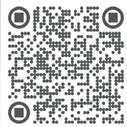NYC
No place for Jews?
IRAN
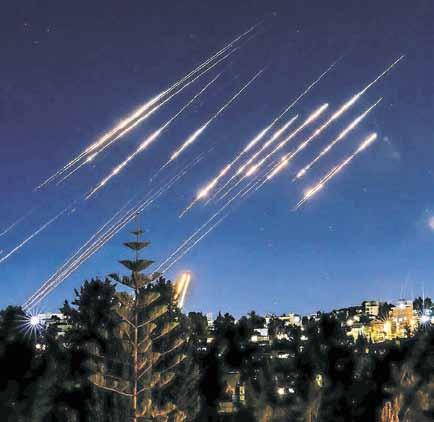
As bombs fall, it’s OK to ask: Where is G-d?

On Oct 7, 2023, the Jewish state endured the greatest massacre of Jews since the Holocaust. Babies beheaded. Grandmothers burned alive. Young women raped next to the corpses of their murdered friends. And now, just months later, thousands of Iranian missiles are blowing Jewish and Arab Israelis to smithereens. Where is the world’s outrage?
But more hauntingly — for believers like myself — where is G-d?
It’s a question many religious leaders are too afraid to ask. But
Judaism is not a religion of silence. Ours is not a faith of resignation.
We do not submit to suffering — we challenge it. In the Jewish tradition, it is not only permitted to question G-d in times of moral catastrophe — it is a mitzvah.
Because the opposite of faith is not doubt — it is indifference.
And the Jewish people, even in our darkest moments, have never been indifferent to G-d’s silence.
We have challenged it.
Our very name — Yisrael (Israel) — means one who wrestles with G-d. Not worships blindly. Not accepts passively. But wrestles.
When Abraham stood before G-d and heard that Sodom would be destroyed, he did not fall to his knees in obedience. He stood tall and asked: “Shall the Judge of all the
earth not do justice?” When Moses descended Mount Sinai and saw the Golden Calf, he did not excuse G-d’s wrath — he smashed the Tablets, demanded mercy, and told G-d He would need to forgive the people or blot him out from the Book of Life.
This is our spiritual inheritance: not piety in the face of evil, but protest.
And today, in the wake of Oct. 7 and in the shadow of Iranian rockets, we must summon that protest once more.
We must ask the Almighty:
How can You allow such horrors to befall Your people? We rebuilt the land You gave us, we revived Your Torah, we made the deserts bloom, we returned to Zion not with swords but with song —
Cuomo’s not a first choice, but the only choice. Vote to stop Mamdani
The Jewish Star endorses Andrew Cuomo for mayor in the Democratic Primary
It’s understandable that some people find Andrew Cuomo unlikeable and irredeemably unsuited to be mayor of New York. It’s also understandable why many will nevertheless vote for Cuomo in the New York City Demoratic mayoral primary (ending next Tuesday, June 24, with early voting underway now through Sunday, June 22).
Count The Jewish Star among them.
Nearly four years ago, Cuomo resigned as governor, disgraced by credible allegations of sexual harassment. And while he was “America’s Governor” during COVID, speaking clearly and calmly to a frightened public, he also ordered hospitalized COVID-afflicted seniors back to their nursing homes, sentencing thousands — the returning seniors and those they would infect in their nursing homes — to likely death. He’s equovcated and outright lied about both scandals and refused to accept responsibility for the many deaths directly attributed to his actions.
Cuomo is an experienced manager who’s pushed through seemingly impossible projects with remarkable speed (including renovations at LaGuardia and JFK airports and Penn Station, and the construction of new Tappan Zee/Mario Cuomo and Kosciusko bridges). He’s also made some unforgivable mistakes.
But as the Far Rockaway Jewish Alliance says so well in its statement on page 25 of today’s Jewish Star:
Cuomo is not a tzaddik. But this isn’t about liking him. We’re not choosing a rebbe — we’re choosing a shield.
Consider the alternative.
His leading challenger is Zohran Mamdani, an Asemblymember who repeatedly, unrepentantly champions antisemetic ideas and is opposed to the very existence of the Jewish state. And while a Mamdani administration’s inevitable refusal to prioritze the protection of Jewish New Yorkers would threaten Jewish lives, his extreme radical, socialist politics — toward housing and business and policing in general — poses a broader threat to the future of New York.
Even the New York Times’ editorial board — without referencing Jews or Israel — said on Monday that Mamdani “is running on an agenda uniquely unsuited to the city’s challenges.”
On The Bulwark podcast on Tuesday, Mamdani equated the
Warsaw Ghetto Uprising with the Intifada.
“His moral laryngitis in the face of Iranian attacks on Israeli civilians further exposes his indifference to Jewish suffering and disqualifies him from any leadership role in this city,” said Rabbi Marc Schneir of the Hamptons Synagogue.
Right behind Mamdani on the anti-Israel left is Brad Lander. He also hates Israel, and as city comptroller cut back on a more than five-decades-long policy of including Israel Bonds in the investment portfolio of the city’s pension funds.
Lander has been clear about his distaste for Israel which, as with Mamdani, is not related to Prime Minister Benjamin Netanyahu, the Gaza war or the establishment of Jewish communities in Judea and Samaria, but rather to the Jewishness of Israel. Unlike Mamdani, Lander sometimes softpeddles his positions and hobnobs with rabbis and prominent Jews, and has generally good relations with Jewish communal leaders.
While Mamdani is clearly worse, neither is acceptable — especially since the two cross-endorsed each other, meaning that through ranked-choice voting, a vote for Lander will likely count for Mamdani. Lander’s stunt on Tuesday in which he provoked a confrontation with ICE agents will likely increase his (and thus Mamdani’s) tally, reminicent of candidate Bill de Blasio’s getting himself arrested in a demonstration of support for Long Island College Hospital in Brooklyn (a cause de Blasio abandoned as mayor).
While the mayoral contest may continue through November, anyone who avoids voting for Cuomo in the primary because they’re banking on salvation in November (when the ballot may feature Republican Curtis Sliwa, Independents Eric Adams and Jim Walden, and Cuomo as an Independent, along with the Democratic nominee if that is not Cuomo) are playing Russian roulette.
In ranked voting — which allowed Eric Adams, who initially had only 30.7% of the vote, to win with 50.4% after eight rounds of ranking in 2021 — voters may vote for up to five candidates in a specified order of preference.
If no candidate immediately gets over 50% of the vote, the candidate with the fewest first-choice votes is eliminated. Votes for the eliminated candidate are then reallocated to the voters’ next-highest ranked choice who is still in the race. This process
of elimination and reallocation of votes continues in rounds until only two candidates remain and the candidate with the most votes (over 50%) at that point is declared the winner. Some Cuomo-haters who nonetheless understand that it’s essential for Cuomo to win see ranked voting as a device through which they can both protest and support the former governor. They’ll do this by ranking their preferred guaranteedto-lose candidate as 1 and 2 before ranking Cuomo as 3.
If that’s what’s required for someone to add Cuomo to their ballot, so be it. (Just be sure not to rank either Mamdani or Lander — and remember, you do not have to rank anyone, you can simply vote Cuomo #1.)
We may find a Mayor Cuomo grating and our consciences may haunt us for voting for him, but we’ll have far more regrets if he loses.
Democratic voters worried about the future security of Jews in the Big Apple — as well as the future of the city itself — have no choice but to vote for Cuomo.
Jewish communal organizations have been slow to recognize the danger posed by this primary election and their messaging even at this late hour is often unhelpful. Meanwhile, conservative Jewish voters in NYC who are registered as Republicans are, by default, supporting Mamdani’s rise. Both Republicans and Democrats are free to vote Republican in November, but New York City remains a one-party town and you’ve got to be in it to win it — if you are not able to vote in the Democratic primary because you are a registered Republican you are ceding ground to those who would destroy us. Party affiliation should not trump the centrality of klal Yisrael. NYC is not Long Island, where Republicans are competitive. City residents who want their votes to mean something must register as Democrats in order to participate in what are often election-deciding primaries.
We will hopefully dodge the bullet this time, but with the left ascending (as candidates like Mamdani, Lander and AOC expand their bases) we should anticipate more serious threats ahead.
Ed Weintrob, Editor & Publisher
Write: Eweintrob@TheJewishStar.com
Zohran Mamdani is the Ken Livingstone of NY

It’s been more than 20 years since I moved with my family from London to New York City. There were many reasons why we traversed the pond, with job opportunities and the chance of a new life in America at the top of the list, but there were also some deeply personal considerations involved as well.
Much as I loved London, and still do, I found myself increasingly anxious at the thought of bringing up two Jewish boys in the city of my birth. I didn’t want fear of antisemitism to govern where they went to school or which neighborhoods we’d be willing to live in. And at that time — with the 9/11 atrocities still fresh, a spate of Palestinian suicide bombings inside Israel, and a war against Saddam Hussein’s regime resulting in a prolonged, US-led occupation of Iraq — this was not idle paranoia but a real set of verifiable concerns.
If any single person could be said to have embodied these concerns, it was the extreme left-wing mayor of London, Ken Livingstone. While in office from the years 2000 to 2008, Livingstone’s hatred of Israel meant that his relationship with the British capital’s Jewish community was at best, tense and strained, and at worst, openly hostile.

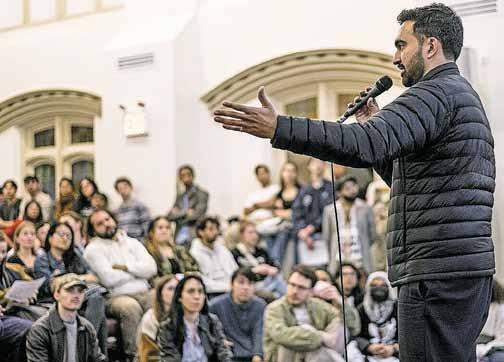
After 9/11, Livingstone was firmly in the camp of those who argued that the death and destruction wrought by Al-Qaeda was ultimately the fault of US foreign policy, and that the Americans had essentially brought all this
upon themselves. As the war against Saddam loomed, Livingstone enthusiastically endorsed the “Stop the War” coalition, a sinister collection of unreconstructed Stalinists and radical Islamists who briefly found themselves at the
pinnacle of a mass protest movement. Most notoriously of all, he befriended a Muslim Brotherhood cleric based in Qatar, the late Sheikh Yusuf al-Qaradawi, falsely depicting him as a moderate who could steer angry young Muslims away from the very same antisemitic, misogynistic and homophobic garbage that the Sheikh himself promoted.
As leader of the Greater London Council during the 1980s, when he was Prime Minister Margaret Thatcher’s bête noire, as well as in the years after he departed the mayor’s office, Livingstone never shied away from endorsing and parroting the wildest and most extreme anti-Zionist myths. Take this gem from 2016: “When Hitler won his election in 1932, his policy then was that Jews should be moved to Israel. He was supporting Zionism before he went mad and ended up killing 6 million Jews.”
As outrageous as this sounds — claiming that Hitler, a genocidal antisemite, had been in favor of merely deporting Jews to a state that didn’t actually exist in 1932, one year before he became Germany’s chancellor — this sort of thing was par for the course with Livingstone.
As I tracked his statements from my new perch in New York City after 2004, I felt a mix of relief that my two small boys weren’t living in this poisonous environment, alongside guilt that my fellow Jews back in London had no choice but to live with it.
Perhaps my chickens are coming home to roost now. In November, New York will hold
Israel’s Iranian payback is long overdue
THANE ROSENBAUM
Distinguished
University Professor Touro College

Now that Israel and Iran are finally at war, let us hope that we are witnessing the final days of the medieval mullahs and ayatollahs — along with their barbaric henchmen — who have brutalized the women, homosexuals and dissident students of Iran since the very first days of the Islamic Revolution in 1979.
Before they targeted their own people, however, this death cult disguised as the “religion of peace” gambled mightily and picked on a much larger enemy — the United States! America’s failure to respond appropriately to Iran’s very first demonstration that they rejected the first principles of Western civilization was a colossal mistake. Our payback was 46 years in the making. And we find ourselves unable to take full credit for finally achieving satisfaction.
That accolade belongs to Israel.
After deposing the Shah of Iran in 1979, back when Iran was, not unlike Israel, a devotee of Western ways (women wore miniskirts, their heads were uncovered and they danced to Motown; homosexuals did not hang from cranes), the Islamists’ first order of business was to take 52 American diplomats hostage and hold them for 444 days.
The ground rules of the modern world: embassies, and the diplomats who work there, are inviolable. You don’t blindfold and keep them prisoner — unless you still live in the Dark Ages and modernity is of little interest to you.
That’s precisely the message the mullahs wished for the world to understand: “We aim to rob you of the Enlightenment.”
•In 1983, Iran bombed the American Embassy in Beirut, along with a Marine barracks, killing nearly 300.
•In 2011, it attempted to blow up a restaurant in Washington. The novelist Salman Rushdie, now an American citizen, lost an eye and the use of an arm from a terrorist acting in accordance with an Iranian fatwa.
•More recently, death threats against Donald Trump, and some of his advisers who scuttled the Iran deal, were issued.
All along, Iranian zealots burned American flags and effigies of Uncle Sam, and chanted, “Death to America!” and “Death to Israel!” Is there anything Islamists won’t shout “Death to…”?
Iran embarked on a plan to arm itself with nuclear and ballistic weapons aimed at the West — Israel only being its most favored target. It repeatedly, including most recently on May 31, flunked its uranium enrichment and nuclear nonproliferation obligations. It regularly cheated, lied and defied inspectors from the International Atomic Energy Commission.
With this rich history of terror sponsorship and anti-American animus, what is all this nonsense that Israel’s airstrikes over Tehran is not “our war?”
This is absolutely America’s war — even if it allows Israel to wage it.
It is true that to Tucker Carlson and his isolationist, antisemitic friends, every dead Jew is a feather in their dunce caps. But most informed, reasonably intelligent people not gaslit by such purveyors of isolationist antisemitism see clearly what is happening over the dark skies and scorching ground of Iran: Israel is America’s ultimate proxy and wingman.
A brutal, theocratic terrorist regime may have finally arrived at its long overdue end of days.
“Be careful what you wish for” is obviously not a Koranic adage. What these prehistoric Arabs and Persians — which go by the names Hamas, Islamic Jihad, the Houthis, Hezbollah and the Iranian Revolutionary Guard — would not give for a return to the world that existed on Oct. 6, 2023.
Iran funded, supplied and helped coordinate the massacre in southern Israel on Oct. 7. The very next day — failing to realize it at the time — these regional death merchants began a slow death march toward their own annihilation.
What looked like a decisive victory against Israel, with trash-talking promises of repeated acts of barbarism — more torching of Israeli infants, gangraping of teenagers, beheading of Israelis and taking hostages, some being American — actually set in motion the eventual assassination of the military and political leaders of Hamas, Hezbollah and now Iran, and a new leadership in Syria.
Aside from a ten-year stalemate with Iraq, Iran doesn’t fight its own wars. It has been the “Mean Girls” of the Middle East — mischievous in meddling, promiscuous in foreign policy, arming terrorists without even having to stain their Persian carpets. Puppet proxies did all the heavy lifting. Now, suddenly, Israel has left them all with a hernia.
Assad is gone from Syria. Nasrallah was killed in Lebanon. Sinwar was taken out in Gaza. Haniyeh was assassinated in, of all places, Tehran! Israel’s war with Iran kicked off with the three
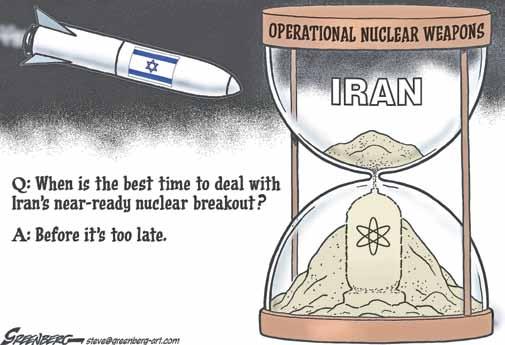
If only the mullahs had realized what a bad idea October 7 truly was!
highest-ranking members of Iran’s Revolutionary Guard — the terrorist arm of its military — and its frontline brain trust of nuclear scientists, all assassinated in two airstrikes. Air-defense batteries, demolished. Nuclear stockpile, under rubble. Uranium enrichment facilities, in shambles. Proxies reeling from Israel’s devastating anti-terror campaigns. With no air force or air defense to speak of, Iran is nothing but a piñata at a birthday party where the blindfolds are off, the bats are heavy, and the sugar rush is fierce.
There’s a movie in Israel’s miraculous derring-do in Iran. Mossad agents were living for years behind the lines. A drone launching site was amazingly constructed and hidden. So many covert intelligence assets were recruited, all no doubt remnants of the Green Movement in 2009 and the Hijab Revolution in 2022.
Thank Allah the Jews arrived to liberate the subjugated Muslims of Iran and end their misery.
Now let’s assist Israel in finishing the job. Deliver the 30,000-ton bunker buster bombs that will destroy whatever fissile
uranium and weapons-making material lies buried deep within the mountainous lairs in Natanz, Fordow and Isfahan. Green light Israel to target Iran’s oil infrastructure and ask the Saudis to make up the shortfall, which the first Trump administration did after decertifying the Iran deal and reimposing sanctions.
It’s finally time to take this nemesis, which spoke so casually of wiping the Jewish state from the map — off the map! The Iranian people have true potential to benefit humankind. They deserve more from a country that only pumps oil, spreads terror and oppresses from within.
The people are decidedly not with the mullahs. They despise them. Unfortunately, Barack Obama, and his foreign policy team (which became Joe Biden’s team), adored them. They worked tirelessly to extinguish from America’s memory the menace that Iran’s Islamic Revolution had always been.
The landscape of the Middle East is now forever remade. With it, the expansion of nations that might join the Abraham Accords is a real possibility. Jews know never to be too confident. But regime change in Iran could result in greater regional stability and acceptance of Israel. If only the mullahs had realized what a bad idea Oct. 7 truly was.
Thane Rosenbaum is Distinguished University Professor at Touro University.
Write: Columnist@TheJewishStar.com
Zohran Mamdani, the Ken Livingstone of NY…
Continued from page 2
a mayoral election, and at the current time, a candidate eerily reminiscent of Livingstone is riding high in the polls.
Zohran Mamdani is a supporter of the Democratic Socialists of America (DSA). Despite the broadly pro-Israel views of its founder, the social democratic intellectual Michael Harrington, DSA is now the political home of assorted Maoists and other performative revolutionaries who loathe the Jewish state and advocate for its elimination. One faction inside DSA is even agitating for the release of Elias Rodriguez, the antisemitic murderer who shot dead a young Israeli couple last month in Washington, D.C., in the name of a “free Palestine.”
The fact that a thoroughly inexperienced candidate with links to such groups stands a credible chance of winning the mayoral election speaks volumes about the time in which we are living. It also illustrates just how pointlessly divisive the issue of “Palestine” is in the American context. For example, I share Mam-
dani’s distress at the eyewatering prices in our grocery stores and the lack of affordable housing across the city — hell, absent his obsession with “Palestine,” I might even be tempted to vote for him! But precisely because of his obsession with “Palestine,” I, like many other Jewish New Yorkers, can only oppose him implacably.
A Mamdani administration would be worrying on at least two fronts. Firstly, he has signaled his readiness to defy state and federal laws against the antisemitic “Boycott, Divestment and Sanctions” (BDS) campaign that targets Israel alone; the idea that the most Jewish city outside Israel would be led by someone who wants to isolate the Jewish state as the first step towards its eventual elimination, which is the explicit aim of BDS, is grotesque. Secondly, the pro-Hamas protest movement, of which Mamdani is a part, is currently the greatest single threat to Jews in America, on the streets of our cities, on our campuses and increasingly in our political institutions. At a time when pro-Hamas thugs have been attacking Hasidic children, harassing Jewish stu-
dents, vandalizing Jewish communal buildings and turning to outright murder, Jews in New York need the full protection of a strengthened, properly trained New York Police Department, not rationalizations for the sickening violence spawned by a movement with which Mamdani identifies.
“[O]ne need not visit Israel to stand up for Jewish New Yorkers,” Mamdani said at a meeting last week with Jewish leftists at a synagogue on the Upper West Side. “I believe that to stand up for Jewish New Yorkers means that you actually meet Jewish New Yorkers wherever they may be, be it at their synagogues and temples or their homes or on the subway platform or at a park, wherever it may be.” On one level, that’s a vacuous statement. On
another, it is completely tone deaf because if you meet Jewish New Yorkers on the subway, where those who wear kippahs are vulnerable to verbal and physical assaults, or at a coffee counter, or wherever else they may be, they will tell you that they can’t remember a time when this great city has been such a hostile place for its Jewish residents. And the reason for that is “Palestine.”
I don’t want New York to go the way of London under Livingstone. As the election approaches, we need to deploy all means to ensure that Mamdani’s bid is defeated — and keep “Palestine” out of New York City politics. Ben Cohen is a senior analyst with the Foundation for Defense of Democracies.
Write: Columnist@TheJewishStar.com
The fact that an inexperienced candidate with links to extremist groups stands a chance of winning the mayoral election illustrates that ‘Palestine’ is in the American context.
‘Each of these faces has a story’: Nova in DC
By Jonathan D. Salant, JNS
Noa Beer walked past the replica of the stage where entertainers prepared to entertain some 4,000 people at a music festival in an Israeli national park. Psychedelic lights rotated around the “Nova” logo, the community that arranged the concert. The nearby bar held actual glasses from the festival, a tablet damaged by bullets and the menu for the festival.
She had been there in the early morning of Oct. 7, 2023, having booked one of the disc jockeys for the Nova music festival in Israel.
Beer walked to another room. There, the walls were covered with 411 rectangles, most containing pictures. These symbolized the people killed at the festival when Hamas terrorists invaded Israel from the Gaza Strip, killing some 1,200 people and taking more than 200 hostages.
Pictures of the 53 hostages, whom Hamas still holds in Gaza, are on a wall in another room of the Nova Exhibition: The Moment Music Stood Still, which opened on June 14 in Washington.
Beer, 30, from Tel Aviv, reached up to the picture of a friend of hers, Avidan Tordjman, 26. Even in the head-and-shoulders picture, he looked tall and thin. Electric candles on the floor helped illuminate the scene.
“This is the room I feel the hardest to be in,” she told JNS. “These are my friends. They look so alive in the pictures as they’re smiling. They’re not here anymore. That’s the hardest thing. Each of these faces has a story.”
These are the stories the organizers of the Nova festival are telling in the roving exhibit now in Washington, which experienced its own fatal antisemitic attack last month when a gunman shouting “free, free Palestine” killed two Israeli embassy staffers about the same age as most of the festival goers, whose pictures hung on the wall.
“It’s definitely more poignant, and also, I feel like this strengthens the Jewish community here — that we are not afraid to come and show who we are. We are not afraid to be the community that we are,” Beer said. “This makes it just that much more important for us to be here.”
Beer was on stage at the festival when she first saw the missiles at 6:29 a.m. on Oct. 7. Then came gunshots, and it became clear that this was not just another incident of Hamas lobbing missiles over the border.
She quickly ran to her car with the DJ, picked up some wounded people on the road and dodged gunfire from armed Hamas terrorists, as she made her way out of Dodge, Beer told JNS.
She said that she worried that a missile would drop from the air onto her car or that a group of well-armed terrorists was up around the next bend, ready to attack. (Like Beer, the DJ was shot at but not wounded and survived the attack.)
“It’s practically a miracle that I’m standing here talking to you,” Beer said.
“I was completely sure I was dead. When I got to the hospital, I did have a moment of relief,” she said. “The relief turned to deep, deep, deep sorrow.”
Beer went to 12 funerals after Oct. 7. “I had to choose between all of my friends, because we had funerals one on top of each other,” she said. Because of her fluency in English, Beer was asked to answer media questions beginning the day after the attack. She continues to do so, and one of her roles in Washington is to talk about the exhibit and Nova.
“I feel like I was left here to be able to bring our community and the rest of the world to the light and to spread more light, because what happened that day is a direct action from hate,” she said. “You can’t fight hate with more hate. We need to be the stronger ones and spread the love.”
One of the festival organizers, Nimrod Arnin, also survived the attack, fleeing gunshots as he drove wounded victims away from the site. Arnin is a founder of the Nova tribe community, formed in 2021, which he described as believing in “love for mankind, love for the earth, love

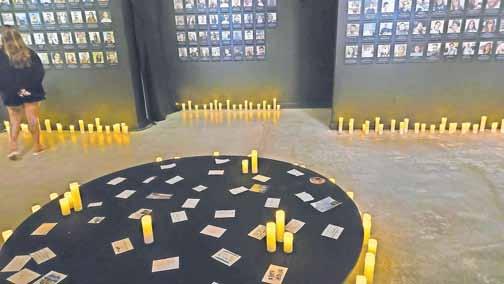
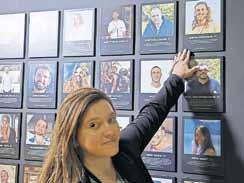
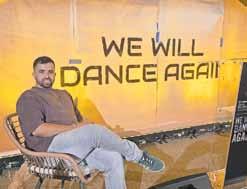
of the country, love for music, of course,” and engaging in community service projects among its other activities.
In another generation, one would have called them children of the Sixties.
After the massacre, Nova set up a foundation and continues to raise money to help the survivors and families of the victims.
It wasn’t lost on Arnin that the exhibit is taking place in a city whose Jewish community is still mourning the loss of Sarah Milgrim and Yaron Lischinsky, gunned down last month after an event at the Capital Jewish Museum.
“This is the best answer” to that attack, Arnin told JNS. “What is the definition of terror? Terror is a group of people who want to frighten us.”
nie-the-Pooh and burned-out hulks of cars that Hamas terrorists set ablaze as the occupants, who sought to flee the killing field, were burned alive. The show contains bullet-riddled portable toilets and a concrete bomb shelter that some of the festival participants unsuccessfully sought to hide in.
The one on display in Washington was where Hersh Goldberg-Polin, a 23-year-old AmericanIsraeli, was captured by Hamas and later executed in Gaza. The Israel Defense Forces found his body in a Hamas tunnel.
And then there are the shoes that festival goers left behind, arranged on a long table in a manner similar to the shocking and disturbing display at the U.S. Holocaust Memorial Museum just two miles away.
“We’re taught about the Holocaust from a very young age,” Beer said. “You can’t try to imagine something like that. Then something like this happens, and you see it with your own eyes.”
“I never thought I’d see true evil,” she said. “I never thought I’d see murder right in front of my eyes. We’re too young and too loving and too happy to see things like this.”
A perpendicular table contains shoes and clothing, as well as other artifacts left behind.
Liat Ekheizer, a resident of Bnei Zion, a central Israeli moshav, helped collect the artifacts beginning the day after the attack.
“All citizens were looking to do something,” she said. “We all felt so hopeless.”
They went through backpacks. They looked into the pockets of clothing. They gathered up jewelry and other personal items. “The things that make you you,” Ekheizer said. “I could see myself in those small bags.”
The exhibit previously ran in Tel Aviv, New York, Miami, Los Angeles and Philadelphia, and it is on view in Toronto until June 22. It is slated to close in Washington on July 6.
While the exhibit ran in Los Angeles, one of the released hostages reclaimed her sweatshirt from the table, and the father of one of the victims found his son’s shoes in Miami. The latter had given them to his son, who wore them to the concert.
“Look at these shoes or these clothes and see yourself in them, because this is something we all do,” Beer said.
“Most people like music. If you want to go to a festival, you want to go in and enjoy it with your friends. You don’t want to be running away from terrorists,” she said. “That’s what these people had to do. Think that you had to run away so quickly that you had forgotten your shoes or your bag or your bra.”
The exhibit ends in what is called the healing journey room — a chance to read about the Nova foundation and reflect on what visitors just saw.
“In the end, this has nothing to do with politics or what you think about Israel or what you think about the Jews,” Beer said. “This has to do with a group of people that went to dance at a music festival, and 411 of them did not come home.”
The exhibition shows the resilience of the Jewish people, according to Arnin. “No one can stop us,” he said.
The exhibit consists of the artifacts that volunteers quickly collected and preserved following the deadliest day for Jews since the Holocaust. It was done “in order to make sure it won’t happen again,” Arnin said. “Nobody can deny it, nobody forgets.”
The remnants on display in the show fill two floors of a building just steps from the arena where Washington’s basketball and hockey teams play, and which houses several major concerts a year.
There are the tents that attendees slept in, including one who brought along a stuffed Win-
The exhibit and the foundation show the world “that we are here to spread our light and our love and show people that we still have hope, that we will continue dancing,” she said. “We will continue having festivals. In the end, love will override the hate, and hopefully one day, we will be happy again like we were before.” Beer believes she survived to continue spreading peace and love.
“Of course it’s hard. It’s devastating,” she said. “But I think we were left here to continue spreading light, and I think we were left here so we can live the lives that they will never be able to. I think of them every day with everything I do. With every place that I see, every beautiful sunset that I see, I imagine my friends seeing it with me.”
“This is what they would have wanted,” she said.


Machu Picchu
Times calls Mamdani ‘uniquely unsuited’
By Vita Fellig, JNS
New York City voters should not “rank” Zohran Mamdani, an anti-Israel state representative, among their choices for mayor in the June 24 Democratic primary, the New York Times editorial board stated on Monday.
“Mr. Mamdani is running on an agenda uniquely unsuited to the city’s challenges,” the board wrote. “He is a democratic socialist, who too often ignores the unavoidable trade-offs of governance. He favors rent freezes that could restrict housing supply and make it harder for younger New Yorkers and new arrivals to afford housing.”
Mamdani brings less relevant experience to the race than any mayoral candidate in New York City history, the editorial board added. (It did not mention criticism of Mamdani’s Jew-hatred.)
“He has never run a government department or private organization of any size,” the Times stated. “As a state legislator, he has struggled to execute his own agenda.”
The editorial board noted that none of the 11 Democratic mayoral candidates offers the potential to become the city’s next great mayor. It did not endorse any candidate but noted that Andrew Cuomo, the former state governor, holds a slim lead over Mamdani in recent polls.
The Times editorial board noted that many New Yorkers plan to vote for the former governor despite “significant shortcomings,” including his handling of the pandemic, during which he had Covid patients put in nursing homes, and allegations of sexual harassment from at least 11 women. (Cuomo resigned as governor in 2021.)
“His list of accomplishments includes paid
family leave, expanded health insurance, a higher minimum wage, a marriage equality law, a strict gun-control law, an ambitious clean energy program, the Second Avenue subway and renovations of John F. Kennedy and LaGuardia airports and Penn Station,” per the Times.
The board also pointed to a potential alternative in mayoral candidate Brad Lander, the city’s current comptroller who is Jewish.
“Mr. Lander is another Democrat who adopted dubious ideas, such as cuts to policing, during the party’s leftward shift of the late 2010s and early 2020s,” it stated. “He has since moderated, though, which demonstrates a welcome ability to learn from experience.”
Given New York City’s ranked-choice voting system — which allows voters to list multiple candidates in order of their preference, and to have their votes redistributed when lower-ranked candidates are removed — the editorial board noted that the outcome may hinge on how voters choose to rank Cuomo and Mamdani, the current front-runners.
“We do not believe that Mr. Mamdani deserves a spot on New Yorkers’ ballots,” the editorial board wrote. “As for Mr. Cuomo, we have serious objections to his ethics and conduct, even if he would be better for New York’s future than Mr. Mamdani.”
‘We do not believe that Mr. Mamdani deserves a spot on New Yorkers’ ballots.’
DESK of RABBI S.M. LEINER-
Note the ACCOLADES from our CLIENTS
RE: SYNAGOGUES and YESHIVOS
Dear Rabbi Leiner, Thank you for replacing the Insurance for our Synagogue, with a Savings of almost 50%.
B.F. Executive Director
RE: REAL ESTATE CORPORATION
Dear Rabbi Leiner, You and Your Experts, have saved our Corp. Very Substantial Sums, with your Quality Insurance Replacement on our Real Estate Buildings. Thank you, M.B. Pres.
RE: HOMEOWNERS INSURANCE
Dear Rabbi Leiner, Our Insurance Company Refused to renew our Insurance Homeowners Policy. However, You and Your Experts were able to Secure for us other Insurance Coverage, even at a much lower Premium, than the Prior Canceled Insurance Policy. Thank You So Much. Mrs. D.S.


*Same
• Obstetrics & Gynecology
• Maternal-Fetal Medicine
• Gynecology-Oncology
• Breast Surgery
• Urogynecology
•
• Diagnostic Ultrasounds
• Breast Biopsy Procedures
• Bone Density Testing
• Nutrition Services

For NSHA grads, accolades and acceptances SCHOOLS
By NSHA
As the school year draws to a close, the North Shore Hebrew Academy High School class of 2025 marks a new beginning. The graduates are celebrating an incredible list of accomplishments, from awards and accolades to acceptances from colleges, yeshivot and seminaries throughout the US and Israel.
NSHA guides students to try new disciplines, develop their skills and explore their options for continued studies. The prep begins in middle school and continues with a comprehensive college guidance program including support for SAT and ACT testing, connecting with college representatives, essay writing, and completing college applications.
Those efforts have paid off, with the US college acceptances demonstrating an impressive diversity of academic institutions including Yale, Vanderbilt, Cornell SC Johnson College of Business, Princeton, Barnard, Columbia, Brown, University of Pennsylvania, George Washington University, Washington University in St. Louis, Albert Einstein College of Medicine Medical Scholars Program through
Yeshiva University, Macaulay Honors College at Queens College, Hunter College, Baruch College, Tufts, University of Florida, the University of Miami, Northeastern, Muhlenberg, Syracuse, UMASS Amherst, Oberlin, Franklin and Marshall, Yeshiva University, Brandeis University and more.
The student achievements this year speak to what makes the school’s culture singular, says Dean Ira Miller.
“Our students are incredibly motivated, they have high aspirations, and they want to learn as much as they can and prepare themselves,” he said. “The NSHA environment produces a culture of expectation –– it motivates them.”
Whatever their interests, Miller says the school works with students and their families to figure out what postsecondary options are right for them.
“Some students come in knowing they want to go into business or art, but high school is a time for exploring and building a foundation,” he said.
The class of 2025’s achievements are evidence of how effective NSHA’s academic rigor and extracurricular opportunities are in preparing students for success.
Strong Judaic foundation
Core to the school’s mission is instilling a love and mastery of Judaic studies and fostering the next generation of Jewish leaders.
This year, Ethan Monhian participated in the Tel Aviv University Hebrew Olympiad. Students from around the world were tested on their knowledge of Hebrew. Ethan placed second globally in the prestigious competition, something he says would not have been possible without Chairperson of the Hebrew Language & Literature Department Rachel Taylor’s guidance.
“I cannot thank her enough for believing in me and my ability to achieve great success,” Ethan said.
Other students are celebrating great strides in Judaic studies, too, such as Talia Beck, who was a Siyyum Scholar and will be continuing her rigorous Judaic studies path at Midreshet Lindenbaum in Israel next year.
Many graduates choose to pursue education in Israel. Of this year’s graduating class, students will attend a wide array of yeshivot and seminaries. Others are beginning their lives after graduation in service, like Jakob
Immersive programming
NSHA’s unique, personalized schedules and specialized programs allow students to focus on the subjects that interest them most –– and set them up for success.
“Our goal is for our graduates to make their mark on the world beyond North Shore,” commented Rosh HaYeshiva / Head of School Rabbi Dr. Jeffrey Kobrin. “We want our alumni to inspire others as we have tried to inspire them during their time with us.”
The school’s Model Congress, for example, builds a wide variety of skills from public speaking to research methodologies and collaboration.
Several members among this year’s graduates have used those skills to attain impressive accolades —
•Class of 2025 co-valedictorian, Ilana Greenberg, earned a prestigious National Merit Scholarship, the John M Stalnaker Memorial Scholarship, awarded to students who are planning to study in the STEM field; she also earned the gold medal at the Long Is-
land Math Fair, and the Grace Hopper Innovation & Leadership Award
•Jordana Bruckheimer, a 2025 salutatorian, won the Nassau County Award in Combating Antisemitism from Bruce Blakeman
•Elizabeth Mirharoon won Best Delegate at JCYMUN while also editing the school’s Science Research Journal
•Abby Rutta, also a salutatorian, won Best Delegate at the Princeton Model Congress.
Whatever combination of programming our students choose, they are known for their initiative.
Graduate Abigail Suler was recognized with the first place prize for leadership by Virtual Enterprise International, an organization that creates educational pathways that align career education and work-based learning with academic standards-based education.
STEM cultivation
From computer science to mathematics, NSHA students have demonstrated excellence in STEM. Director of College Guidance Susan Davidson says she’s seen the class of 2025 go See NSHA on page 10



You are the generation that will define what it means to be proudly Jewish in the 21st century. Whether you lead in medicine or technology, education or business, in public service or Torah studies, lead as Jews. Lead with vision, lead with strength, lead with integrity.
Bart Baum, NSHA President
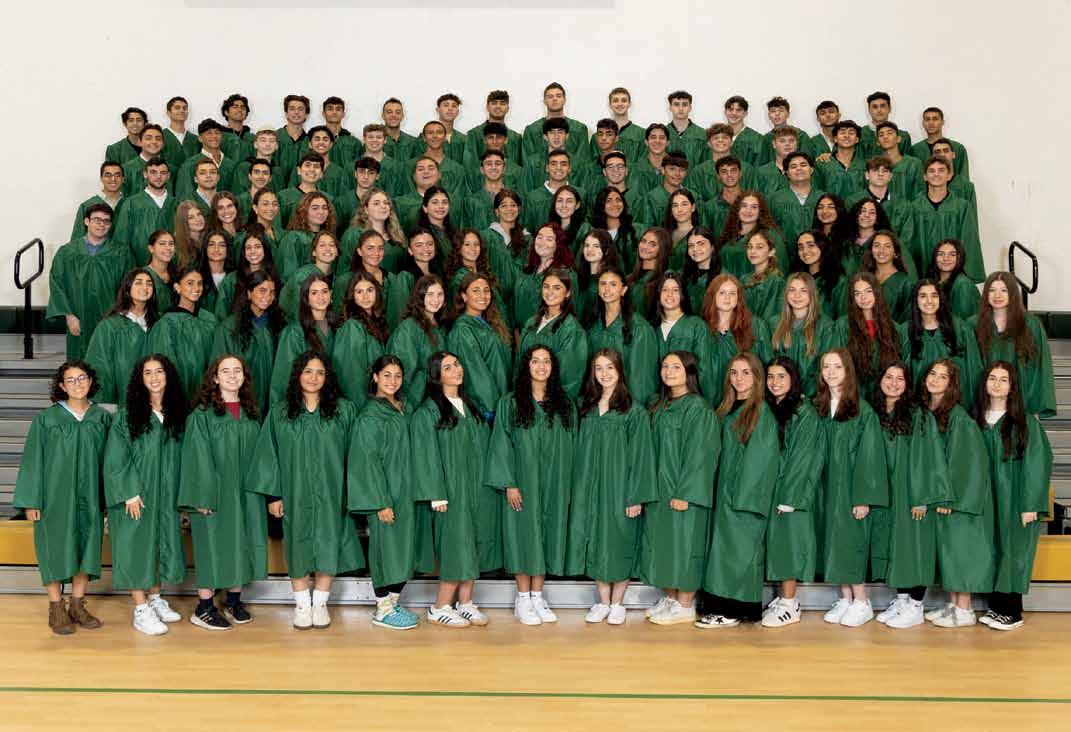
Adelphi University*
American University
Barnard College*
Binghamton University*
Brandeis University*
Brown University*
Bucknell University
Clark University
College of Charleston
Columbia University*
Cornell University*
City University of New York
Baruch College*
Brooklyn College*
City College
City Tech
College of Staten Island
Hunter College*
John Jay College
Lehman College
Queens College*
York College
Drexel University*
Emerson College
Fashion Institute of Technology*
Florida Atlantic University
Florida Institute of Technology
Florida State University
Fordham University
Franklin & Marshall College
George Washington University*
Hofstra University
Indiana University
Ithaca College
LIM
Long Island University
Lynn University
Macaulay Honors College*
Manhattan University
Monmouth University
Muhlenberg College
New York Institute of Technology*
New York School of Interior Design*
New York University*
Northeastern University
Oberlin College
Pace University
Penn State University
Princeton University*
Rutgers University
Seton Hall University
St John's University*
State University of New York Buffalo
Buffalo State University
Farmingdale
Westbur y
Oneonta
Stony Brook University*
University at Albany*
Syracuse University
Temple University
Touro University*
Towson University
Tufts University
University of Colorado at Boulder*
University of Delaware
University of Florida
University of Hartford
University of Mar yland*
University of Massachusetts at Amherst
University of Miami
University of Pennsylvania*
Vanderbilt University
Washington University in St. Louis*
Yale University*
Yeshiva University*
Yeshiva University Honors*
Yeshiva University/
Einstein Medical Scholars Program*
ISR AEL PROGR AMS FOR WOMEN: Baer Miriam Seminar y*
Bar Ilan Israel XP*
EFG @ Aish*
Machon Ma’ayan*
Midreshet Amit*
Midreshet Amudim*
Midreshet Eshel*
Midreshet Harova*
Midreshet Lev
Midreshet Lindenbaum*
Midreshet Moriah*
Midreshet Torah V’Avodah*
Migdal Oz*
ISR AEL PROGR AMS FOR MEN:
Bar Ilan Israel XP*
Derech Ohr Somayach*
EFG @ Aish*
Mechinat Keshet Yehuda*
Mechinat Otzem/Atzmona
Yeshivat Ashreinu*
Yeshivat Eretz HaTzvi
Yeshivat Lev HaTorah*
Yeshivat Netiv Ar yeh*
Yeshivat Reishit Yerushalayim*
Yeshivat Sha'arei Mevaseret Zion
Yeshivat Torah V'Avodah
Yeshivat Torat Shraga*
SKA salutes its Val, Sals and Keter Shem Tov SCHOOLS
By Stella K. Abraham HS for Girls
Valedictorian Hadassa Klahr
Throughout her years at SKA, Hadassa Klahr has been a dedicated student and an active member of her class. She served as model congress and college bowl captain in addition to being a part of the debate team, Israel action committee, Torah bowl and writing for the school newspaper. She also did science research and was published in the Anthology of Poetry for Young Americans. She enjoys volunteering and helping others in her free time.
Hadassa was Yachad President and volunteers at Ishine, Yachad, and friendship circle weekly. She has also participated in the Tikvah Scholars Program. She has enjoyed taking numerous AP courses including AP Calculus BC, AP Chemistry, AP Biology, AP Government, AP United States History, AP Psychology, and AP World History. Hadassa is a member of the principal’s honor roll and was inducted into the Re’ut National Honor Society.
Next year, Hadassa will be studying at MMY in Israel followed by attending honors at Stern College for Women.
Salutatorian Sarah Goldstein
Sarah Goldstein has been an involved and committed student at SKA throughout her four years. Sarah’s
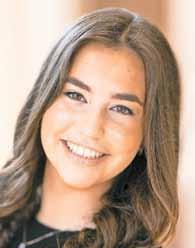
rigorous course selection included, AP World History, AP US History, AP Chemistry, AP Calculus BC, AP US Government, and AP Psychology. Sarah is a member of the principal’s honor roll and was inducted into the Re’ut National Honor Society.
Sarah was a dance head in SKA’s Production 2025 and a captain of the college bowl team. She was a staff writer for SKAppenings and an editor in the weekly Parsha Press. Over her years at SKA she volunteered as a peer tutor, friendship circle volunteer, and JEP counselor. She will be attending MMY in Israel next year, followed by the honors program at Stern College for Women.
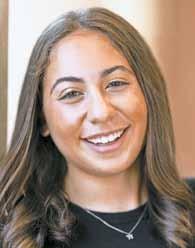
Salutatorian Eden Israeli
Eden Israeli has been a distinguished and well-rounded student throughout her four years. Her challenging academic program included AP World History, AP US History, AP Chemistry, AP Calculus BC, AP Psychology, and AP Government and Politics. Eden earned a place on the principal’s honor roll and was inducted into the Re’ut National Honor Society. She contributed as a writer for the Matrix, participated in e2k, volunteered as a peer tutor, and played on the varsity Volleyball team.
Eden will be attending Michlalah
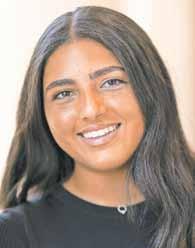
in Israel next year, followed by Touro University.
KST Kayla Paul
Kayla Paul, the 2025 Keter Shem Tov awardee of SKA, has consistently demonstrated her love for chesed and her desire to volunteer and help others throughout the community. Kayla can often be seen volunteering at the Special Children’s Center, Ishine, Tomchei Shabbos, or JEPP during her free time.
Kayla is always looking for a chance to help others, whether that means going out of her way to pick
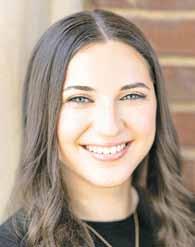
someone up for an event, baking for a bake sale, or tutoring someone who needs help in a class. When she is not dedicating her time to helping others, Kayla takes on her role as College Bowl captain and participates in a Halacha Bekius program in SKA. Kayla has received Principal’s Honor Roll and the student-voted Middot award for the past three years and has had a poem published in the Anthology of Poetry by Young Americans. She will be spending a year in Israel at Michlelet Mevaseret Yerushalayim and then attending the Honors program at Stern College for Women.
Shulamith HS celebrate its 7th graduating class
By Shulamith High School
Shulamith High School celebrated its 7th annual graduation ceremony. The evening highlighted the accomplishments of its newest alumni, while keeping focus on the ongoing heartache of the hostages, exemplified by the poignant decision made by many in the graduating class to decorate their caps focusing on Eretz Yisrael.
SHS Valedictorian, Aliza Zahler, has challenged herself in every arena throughout her high school journey, partaking in any academic opportunity available. She holds an astonishing spectrum of knowledge and extracurriculars, holding court at Mock Trial and winning several awards at CIJE STEM competitions. She was an AP Scholar with Distinction, a finalist in the Jerusalem Science Contest, and Chidon Hatanach National Qualifier. Aliza’s capabilities literally shined this year at Production spotlight, prompting the staff at the venue to ask if they could meet “this
NSHA…
above and beyond with their studies and their pursuit of higher learning.
“Having excelled in the math cur-
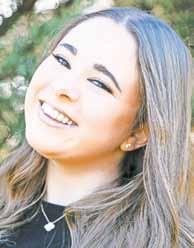
student who figured out our lighting system in an hour.” She plans to attend MMY this fall, followed by Stern Honors as a Leadership Scholar.
Our Salutatorian, Tzipora Thau,
riculum at our school, one student pursued coursework at NYU to reach even higher in math and physics,” she said.
That thirst for knowledge has led to several awards for members of the graduating class—
•Sarah-Kate Leibowitz won the Ada Lovelace Award for Excellence in Computer Science
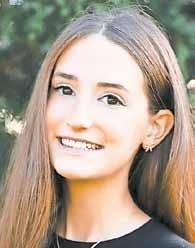
combines academic strength and leadership qualities. She is a force in the classroom, on the production stage as Dance Head, and through her extensive commitment to chessed. Through
•Natalie Terrani was recognized with the Computer Science Department Award
•Class of 2025 co-valedictorian Maya Arama was selected for the highly competitive Albert Einstein College of Medicine Medical Scholars Program through Yeshiva University.
NSHA students also garnered
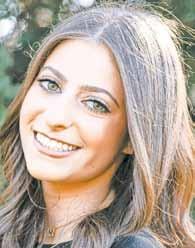
Tzipora’s respectful, gracious, and humble nature, she has brought excellence and dignity to every corner of SHS. Tzipora plans to attend Michlalah and Touro College.
awards for their athletic and artistic prowess, says Miller, and altogether, he says their success demonstrates the results of programming that nurtures students’ abilities.
“Our students’ achievements span each subject area, from the humanities, the arts, the sciences, mathematics, languages, technology, and fi-
The Keter Shem Tov honor is awarded to a student who exemplifies selflessness, kindness, inclusivity, and respect to all whom she encounters. The awardee is chosen by her peers and faculty, and the recipient is revealed at the graduation ceremony. Mia Kaplowitz, this year’s Keter Shem Tov, has embodied these qualities throughout her high school years. Through her positivity, friendship, and humility, she has made every classmate feel accepted and honored. Mia was G.O. Treasurer, a member of the basketball and soccer teams for all 4 years of high school, a regular participant in the Beit Midrash program, and an Israel Advocacy Student Ambassador. Mia plans to attend MMY next year, followed by Queens College. Congratulations to all of our wonderful graduates. We are so proud of your achievements and character, and we know you will continue to make us proud as you take your extraordinary qualities into the world.
nance,” he said. “At the same time, our program steeps our students in Torah learning with courses in Tanach, Talmud and halacha/machshava.
“Our educational mission is to inspire our students to grow and develop not only academically, but also emotionally and spiritually –– they are our leaders of tomorrow.”
HAFTR valedictorian, salutatorian: Outstanding
By HAFTR
HAFTR High School is proud
to celebrate the exceptional accomplishments of our Valedictorian, Sean Harris, and Salutatorian, Quinn Oliner — two students whose dedication, leadership, and character exemplify the best of what our school stands for.
Valedictorian Sean Harris has distinguished himself as a scholar, leader, and innovator. With a 4.0 GPA and an impressive array of extracurricular activities, he has left an indelible mark on HAFTR.
From captaining the Robotics and College Bowl teams to contributing to multiple student publications in English, Hebrew, and Spanish, Sean has demonstrated both intellectual depth and creative range. His accolades include Vale-
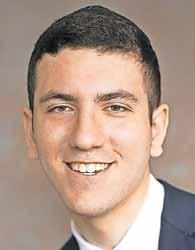
dictorian honors, National Merit Scholarship recipient, AP Scholar
with Distinction, and medals in the Long Island Math Fair.
Sean’s commitment to service shines through his work as a peer tutor, mentor, and volunteer for both school and community initiatives. His deep engagement in STEM, Judaic studies, and music reflects his holistic pursuit of excellence.
Salutatorian, Quinn Oliner has made a powerful impact on both the academic and extracurricular life of the school.
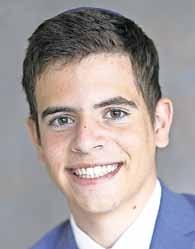
A standout in the classroom and a leader among his peers, Quinn serves as President of the National Honor Society and is a multi-year Tikvah Fellow, where he has explored the relationship between Jewish values and Western civilization. He is the longtime editor of HAFTR’s Haftorah Newsletter, a dedicated member of both College
Bowl and Torah Bowl teams, and a competitor in the CIJE Hackathon. Quinn is also a proud three-sport athlete, playing for HAFTR’s basketball, football, and softball teams in junior varsity, and continuing to varsity soccer and hockey, balancing athletics and academics with remarkable discipline.
Sean and Quinn now look ahead to bright and exciting futures. Sean will be attending Binghamton University as part of their prestigious Scholars Program, where he plans to study Computer Science.
Quinn will spend a meaningful year in Israel at Yeshivat Har Etzion (Gush), and will then continue his academic journey at Yeshiva University, where he has been accepted into the Honors Program and will major in Mathematics.
Central, YU’s girls HS, celebrates its graduation
By YUHSG (Central)
It’s the end of an era.
On June 9, the class of 2025 graduated from the Yeshiva University High School for Girls (Central), officially transforming from students to proud alumnae and savoring the last chance to celebrate one another as a class before making their way into the world.
For Central faculty, the school’s 73rd annual commencement, at YU’s Lamport Auditorium, was an opportunity to honor students who spent the last four years striving to become their best selves.
The event began with misheberach and tehillim from Central’s Mashgiach Ruchani, Rabbi Joshua Goller, followed by a message of welcome from Central’s Head of School, Bracha Rutner, who highlighted the landmark importance of the evening.
“Graduation marks the conversation between who you’ve been and who you’re becoming,” Rutner said. “Not every word needs to be long to be meaningful, and not every path the same to be worthy. The class of 2025 is about to embark on their future, hav-
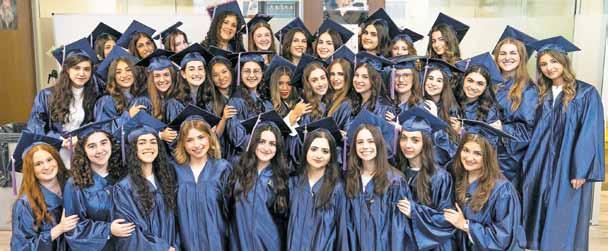
ing arrived there on a path that they built with the help of their classmates, their teachers and their parents.”
Following Rutner’s remarks was the presentation of the first annual Dr. Regina Herzlinger STEM award, named in honor of a 1967 Central alumna and the first woman to be tenured and chaired at Harvard Business School. Intended to honor a graduat-
ing senior who will be studying STEM in college, the first award was given to Reema Gampel.
Among others celebrated for their accomplishments were this year’s Stephen Klein Memorial Founders Award
Valedictorian for Excellence in Honors Jewish and General Studies, Shira Fisher, who delivered a reflection on her experiences at Central.
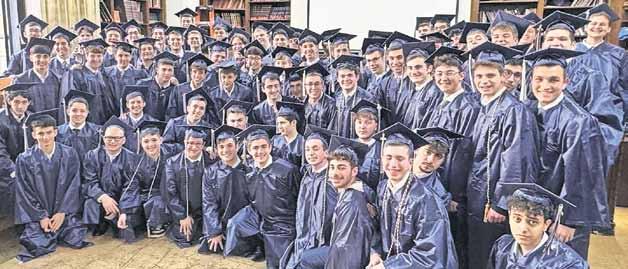
Salutatorians Maya Kikov and Serah Tolchin were also recognized. The class’s Keter Shem Tov Award was presented to Gabrielle Boriskin, with the Leah Lefkowitz Humanitarian Chesed Award going to Dena Joshua.
The Malka Fishhaut Memorial Award, intended for a senior demonstrating overall excellence in Judaic Studies who is bound for studies in Is-
rael, was given to Neima Bronstein.
Graduation awards were granted by Central’s Associate Principal, Leah Moskovich, and the graduates were presented by Judaic Studies faculty member and Senior Grade Dean, Rebecca Teper. “I am so proud of this graduating class — their growth, their leadership, and their heart,” Moskovich reflected. “Central will miss them deeply, and so will I.”
The theme of the 2024-2025 school year was courage — a fitting theme for this particular class, who have made their last year as Wildcats count and are entering a changing world with bravery, character, and kindness.
The Central community congratulates the class of 2025 for their accomplishments and looks forward to welcoming these new graduates into the YUHSG alumnae network. It’s been a wildly successful year at YUHSG. From academics to the visual and performing arts, athletics to chesed initiatives, students in all corners of the school have found opportunities for progress and have gathered the courage to change and grow.
MTA, YU’s boys’
HS, graduates 75
The Yeshiva University High School for Boys — MTA (Marsha Stern Talmudical Academy) — held a graduation ceremony
for 75 seniors. The event featured several speakers, including YU’s president, Rabbi Dr. Ari Berman.
5 Towns 5K run/walk aids Israel Chesed Center
By Melissa Berman, LI Herald
This year’s 5 Towns 5K Run/Walk for Israel, staged in North Woodmere Park on June 8, partnered with the Hewlett-based Israel Chesed Center.
The grass-roots chesed center raises funds and collects and sends tactical supplies to Israel Defense Force soldiers and needed goods to displaced Israeli families.
“It was great — we had almost 500 people running in support of Israel, County Executive Bruce Blakeman came to watch the race and we are extremely appreciative for Bruce and his staff,” said Israel Chesed Center co-founder Moshe Bodner.
The 5K started in North Woodmere Park, making its way through the local streets of North Woodmere with major stretches on Cliffside Avenue and Flanders Drive — along with a path through Nutley Place, Glenridge Avenue, Mulberry Place, Cranford Avenue and Kilmer Lane — before ending back at the park for an awards ceremony.
“The Israel Chesed Center is the Five Towns community response to the Simchat Torah Massacre and the ongoing war,” according to 5towns5k. org. “It supports soldiers, wounded soldiers, displaced persons, and medical volunteers to name just a few of its projects. It has shipped countless supplies to people in need in Israel.”
First place went to Cedarhurst resident Dov Sternberg, 48, with a time of 18:05.17. Second place went to Jacob Pekelis from West Hempstead and third place to Zac Nelkenbaum from Cedarhurst.
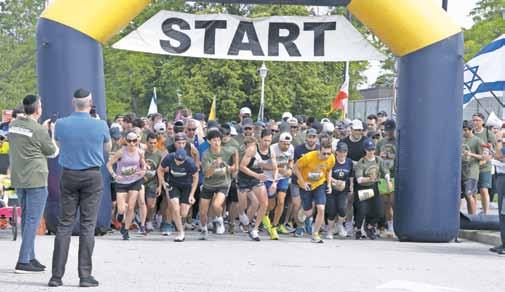
“The race shows that the community supports Israel and that we’re unified and not going to back down,” Bodner said. “We will fly our flags proudly and wear our race shirts proudly. We had amazing feedback from people who have done the race many years and from newcomers. We look forward to doing the race again.”
Maidenbaum Property Tax Reduction Group was a major sponsor of the event, along with
Schumsky, Squeez’r, Abraham Roofing, and PaKua Long Island.
“Maidenbaum is proud to have once again sponsored the annual 5Towns5K in support of the Israel Chesed Center,” Amy Madmon of Maidenbaum Property Tax Reduction Group wrote in an email. “We continue to stand with Israel and encourage our community to do the same.”


Leket Israel feeds thousands with LIers’ help
By Melissa Berman, LI Herald
Residents from the Five Towns and elsewhere on Long Island are contributing to Leket Israel by donating, volunteering or hosting events with the proceeds benefitting the national food bank for Israel,
Leket Israel rescues tens of millions of pounds of fresh, surplus food in Israel. They are partnered with 300 nonprofit organizations that distribute the produce and hot meals to hundreds of thousands of in-need Israelis each week.
In Hebrew the word leket means, “to glean” and is a mitzvah
Cedarhurst resident Yael Gurevich organized a May 28 sisterhood event at the Young Israel of Lawrence-Cedarhurst, along with American Friends of Leket Israel,
“I thought it would be a good idea to raise awareness and also to hopefully bring in other people to become more aware of Leket,” Gurevich said.
Her fundraiser included a presentation from Jennifer Zwiebel, senior development officer for the Long Island and Greater New York re-
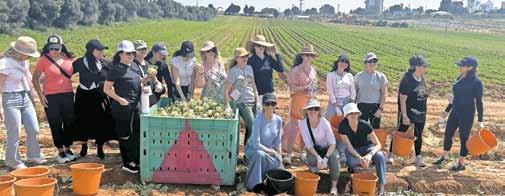
gion of American Friends of Leket, along with a hands-on demonstration using various fruits and creating fruit soup, fruit leather and sorbet by Chaia Frishman of Fruit Platters and More, in Far Rockaway.
Gurevich said that when she volunteered with Leket in Israel last summer, “We pruned
trees in an orchard in the south. The farmers needed a lot of help and we were happy to do that for them.”
Tova Markowitz, from Lynbrook, volunteered in February and will be hosting an event with them in the fall for the Hewlett-East Rockaway Jewish Centre.
“I’m not an outdoorsy gardening person, but when I go to Israel I want to do that type of work,” Markowitz said.
Leket is helping to fight “agricultural terrorism” that occurred on Oct. 7, 2023 in the Hamas attacks, she said. “Hamas caused fires on the fields that killed all the crops and when you’re killing the crops people can’t get fed.”
“I feel a deep sense of pride and fulfillment to be able to represent Leket Israel and share the incredible work that they do to provide food, a basic human need,” Zwiebel wrote in an email.
Zwiebel learned about Leket through family members who support them in Israel as their charity of choice.
“Right now, our greatest need is for donations during the War with Iran,” she said. “There is a deepening crisis in food security and with the uncertainty of how long the war will go on, the pressure on Israel’s food supply system is only intensifying.”
“Food is not a luxury, it’s a lifeline,” she wrote. “We need the support of our friends who care about Israel and its people.”
Kulanu stages 25th annual fair in Cedarhurst
Though postponed a month due to bad weather on the original date of May 4, the 25th annual Kulanu Fair on June 8 in Andrew J. Parise Cedarhurst Park was a fun-filled day as the sun shined bright. Between two and three thousand people attend the fair every year.
The fair featured bounce houses, carnival booths, crafts, food, obstacle course, raffles, roller coasters and more.
Kulanu is a not-for-profit organization serving children and adults with special needs. In Hebrew, Kulanu means “all of us.” Kulanu Academy, in Cedarhurst, offers a variety of educational, clinical and vocational programs for students aged 11 to 21 with special needs. The educational curriculum includes life skills, communication and Common Core Regents-based instruction. — Melissa Berman

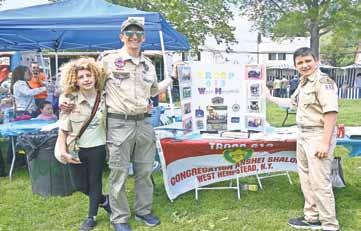

WINE AND DINE
Finding new dairy dishes in an old cookbook
EthEl G. hofMAN

As I prepared for Shavuot, I rifled through books of recipes, looking for something different, and I came upon “The Settlement Cook Book: The Way to a Man’s Heart,” a tome I rescued from a collection that I had placed aside for donation.
Memories came flooding back. It was one of my shower gifts, long before the aid of food processors and all the various gadgets now available to save time, money and effort. As a young Scottish bride, it was a book I referred to constantly. It demonstrated how ingredients found in the United States could be incorporated into not only my mother’s Jewish dishes but also those of the massive immigration of Eastern Europeans flooding into America.
“The Settlement Cook Book” is a compelling read (though admittedly, the subtitle brings a chuckle). It was the brainchild of Elizabeth (“Lizzie”) Black Kander. Born in 1858 to German Jewish parents who were founding members of Congregation Emanu-El B’ne Jeshurun in Milwaukee a decade earlier, she grew up influenced in reconciling religion with progressive ideas. In 1881, she married Simon Kander; she had met him through their involvement in school reform.
When few young women worked outside the home, Lizzie did. She served as a truancy officer, seeing firsthand the deplorable living conditions of Russian immigrant families in the Milwaukee area. She refused to accept social reform as essentially Christian.
In 1900, she joined with a Jewish Sisterhood to establish a settlement house where she taught classes to help educate and Americanize immigrant women. But the greatest success was within Jewish communities oriented toward getting ahead through education. And that meant culinary knowledge, too — melding Old World-style ingredients and kosher-food handling with what could be found in their new country.
Kander, who lived to the age of 82, was a visionary. She pondered the idea of using her experience for the benefit of others. “Why not a cookbook? Not just recipes, but advice on good health, food storage, nutrition and housekeeping,” she was said to have thought. It could be used as a tool to help immigrant women better adapt to American life.
Besides, money was needed to keep the settlement house funded. Its board of directors, however, refused to provide the $18 needed to print the cookbook.
“They didn’t think the work I was doing for
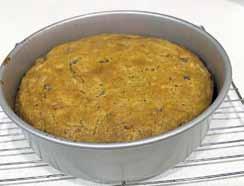

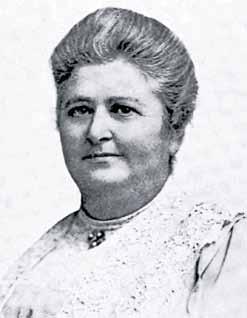
young women was worth spending time or money on, much less publishing a book,” she said in an interview. “But I’ve known since a young age that men have a tendency of being wrong.”
Undaunted, Kander approached Metron Yewdale, a Milwaukee printer who agreed to undertake the work. The costs were supported by selling advertisements for household items like baking soda and clothing. It paid off. The first “Settlement Cook Book” was published in 1901, and 1,000 copies sold out within a year. More than 40 subsequent editions, totaling 2 million copies, followed the original edition. My copy includes more than 3,000 recipes, as well as information compiled in sections titled Emergency Housekeeping; Marketing Guide; Invalid Cookery; Daily Meal Planning; and Your Budget.
While Shavuot is now past, the dairy or parve recipes below, with updated shortcuts, were inspired by the “Settlement Cook Book.” Most ingredients for each recipe can already be found in your pantry or fridge, and the dishes can be made year-round, not just for the holiday. (There is one standard, fail-proof chicken dish that works for Shabbat dinner.)
Serve the super-easy Creamy Spaghetti with fresh herbs, along with a fresh fruit salad. Quinoa was not a familiar ingredient in Eastern


Europe, though it’s an appropriate addition to the Shavuot table. The recipe for Ricotta Cheese Cake, a family favorite of mine, was generously shared by Theresa Morrone, a friend in Florida. It’s a lighter version of the denser, New Yorkstyle cheesecake most Jewish families are accustomed to this time of year.
‘Milchik’ Borscht (Dairy)
Serves 4-6
Cook’s Tips:
*Cooked beets are available in the supermarket. Grate them on the large side of a grater. There’s no need to use a food processor.
*Citric acid, extracted from citrus and other acidic fruits or a byproduct of metabolizing sucrose or glucose, was used in the original recipe. You can substitute sour salt, available in most markets, or use lemon juice or vinegar.
Ingredients:
• 1 package (about 8.8 ounces) cooked beets, grated
• 1-1/2 cups water
• 3 Tbsp. freshly squeezed lemon juice or to taste
• 1 Tbsp. sugar or to taste
• pinch of salt
• 1 cup sour cream
• fresh or dried dill as garnish (optional)
Directions:
In a bowl, combine the beets, water, lemon juice, sugar to taste and salt. Mix well. Whisk in

the sour cream.
Sprinkle with dried or fresh dill (optional). Chill and serve.
Chicken With Mushrooms and Carrots (Meat)
Serves 4-6
Cook’s Tips: •In the original recipe, mushrooms are boiled for 5 minutes in salted water before adding to the chicken. •This recipe is heavy on salt. Use to taste.
Ingredients:
• 1 (3-1/2 pound) fryer-boiler chicken, cut up
• 1 to 2 tsp. salt
• garlic powder
• paprika
• 1/4 cup vegetable oil
• 1 medium onion, sliced
• 12 to 15 baby carrots, sliced in half lengthwise
• 1/3 cup vegetable broth
• 1 lb. fresh mushrooms, washed, patted dry and sliced
• 2 green onions, trimmed and cut into half-inch pieces
Directions:
Sprinkle chicken pieces with salt, garlic and paprika.
In a large deep skillet, heat vegetable oil over medium heat. Add the chicken and onion.


































































Fallen Ukrainian chef’s kosher restaurant dreams
By Hanan Greenwood, Israel Hayom
Zvi-Hirsh (Grisha) Zovergzde, a 32-yearold married father of two young children, was killed last week during combat operations on the Kherson front.
The professional chef from Odessa served in the Ukrainian Armed Forces’ 34th Brigade, a unit tasked with protecting southern Ukraine from Black Sea invasions and securing major river estuaries.
Zovergzde left behind his wife and two children — 4-year-old Alisa and 5-year-old Lev — along with ambitious dreams that will never be fulfilled. The Odessa resident had planned to establish Europe’s first kosher Michelin-star restaurant in his beloved port city, waiting only for the war’s end to pursue this culinary vision.
Ukrainian military officials notified Yaakov Siniakov, who oversees Jewish soldiers for the Federation of Jewish Communities of Ukraine (FJCU), of Zovergzde’s death. Siniakov coordinated the waiver of post-mortem examination procedures and arranged for a traditional Jewish funeral in Odessa.
The deceased had graduated from Odessa’s Jewish Chabad school, developing deep
roots within the local Jewish community that shaped both his personal and family life through years of active participation in community affairs.
“Zvi-Hirsh belonged to all of us — our student, community member, and defender who sacrificed his body for his homeland,” said Chabad emissary Rabbi Avraham Wolff, Zovergzde’s spiritual leader.
“His character uniquely blended Jewish compassion with extraordinary bravery. Our hearts ache for his family. … His memory will live on through our love and sorrow, may his soul find eternal peace. Our entire community grieves while praying for his soul’s elevation, embracing his family during this painful time.”
This death follows the recent loss of Jewish soldier Andrei Korovsky from Zhytomyr, who taught at the local Chabad school and died last week from cardiac complications. Korovsky had operated drones, sustained combat injuries, returned to active duty, but suffered fatal heart problems while deployed at the front.
Approximately two weeks earlier, Ukrainian forces lost actor and journalist Maksym Nelipa in eastern Ukraine battles. The 48-year-old had
been among Ukraine’s most recognized reality television personalities before the war began.
His son Artyom, currently serving with the 12th Battalion of the Golani Brigade, received news of his father’s death while stationed in the Gaza Strip.
Nelipa abandoned his entertainment career when hostilities erupted, reporting to Kyiv recruitment centers in his native city to enlist. After front-line deployment, he earned promotion to company commander, and was wounded in January 2025. Following hospital treatment in Dnipro, he returned to active duty.
Ukrainian media provided extensive coverage of the Jewish hero’s sacrifice. The Jewish federation again intervened to secure proper burial arrangements, locating a military cemetery plot in Kyiv and preventing cremation — a practice increasingly common for fallen Ukrainian soldiers.
According to Rabbi Mayer Stambler, who chairs the Jewish Communities organization, estimates suggest more than 200 Jewish fighters have perished during the conflict.
“We facilitate Jewish funeral services alongside Chabad representatives throughout

the country, provide financial assistance to bereaved families, and conduct prayers and Kaddish recitations honoring our fallen heroes,” Rabbi Stambler explained.
Finding new dairy dishes in an old cookbook…
Brown lightly on all sides. Add the carrots and broth. Cover and simmer over a low heat for 30 minutes or until tender.
Add the mushrooms and green onions. Simmer for 15 minutes longer.
Adjust seasoning to taste.
Creamy Spaghetti With Fresh Herbs (Dairy)
Serves 6-8
Cook’s Tips: •Any fresh herbs may be substituted for parsley and chives. •To reheat leftovers, stir in a little more milk, cover and microwave at high for 2 to 3 minutes.
Ingredients:
• 1 box (16 oz) spaghetti, cooked and drained according to package directions
• 1 tablespoon vegetable oil
• 3 teaspoons bottled chopped garlic
• 8 oz whipped cream cheese, softened
• 3/4 cup grated Parmesan cheese
• 1 cup snipped fresh parsley, lightly packed
• 1/3 cup snipped chives, lightly packed
• 1/2 to 3/4 cup milk
• freshly ground black pepper to taste
Directions:
Place hot spaghetti in a large bowl. Set aside. Heat the oil in a small skillet over medium heat. Add the garlic and cook, stirring for 30 seconds. Stir into the spaghetti.
Add the softened cream cheese, parmesan cheese, parsley and chives. Stir in enough milk to make a soft mixture.
Turn into a serving bowl, sprinkle with a few grinds of black pepper. Serve hot.
Quinoa Vegetable Salad (Pareve)
Serves 6-8
Cook’s Tips: •Native to South America, quinoa is grown mainly for its seeds, which are high in protein, fiber and minerals. It’s a complete protein containing all nine essential amino acids. And it’s gluten-free. •Quinoa is bitter. Before cooking, place in a mesh strainer and rinse thoroughly under cold running water for at least 30 seconds. Shake to remove any water. Cook as directed in recipe. •To make this recipe vegan, substitute maple syrup for honey in the dressing. •Quinoa may be cooked 1 to 2 days ahead
of time, refrigerated and then ready to use.
Ingredients:
• 1 cup dried quinoa, rinsed
• 2 cups water
• 1/2 cucumber, diced
• 1 (15-oz) can chickpeas, drained
• 1 red or yellow bell pepper, diced
• 1-1/2 cups diced frozen peas and carrots, cooked
• 1 cup grated carrots
• 1/2 cup coarsely chopped walnuts
• 1/2 cup dried cranberries
• 1/2 cup fresh mint, snipped finely
For the Dressing: Mix 1/4 cup extra-virgin olive oil, 1/4 cup white vinegar, 2 teaspoons Dijon mustard, 2 tablespoons fresh lemon juice, 1/2 teaspoon honey and 1/2 teaspoon salt or to taste. Place in a jar with a tight-fitting lid. Shake well. Use at room temperature.
Directions: Place rinsed quinoa and 2 cups of water in a medium saucepan. Place over medium heat and bring to a boil. Reduce heat to low.
Simmer slowly and cook uncovered until all liquid is absorbed, about 10 to 15 minutes.
Remove from heat. Let rest for 5 minutes. Fluff with a fork and transfer to a large bowl. Add the remaining ingredients and stir lightly. Pour the dressing over and toss to mix.
Serve chilled.
Carrot Pudding Cake (Pareve)
Serves 4-6
Cook’s Tips: •Quick to make and bake, this moist pudding cake has a crisp crust. It freezes well. •An 8×8-inch baking dish works well instead of a round 7-inch baking pan.
Ingredients:
• 3/4 cup pareve margarine, softened
• 1/2 cup brown sugar
• 2 eggs, lightly beaten
• 1-1/2 cups grated carrots
• 2 Tbsp. of lemon juice
• 1 tsp. ground ginger
• 1/4 cup raisins (optional)
• 1-1/4 cups all-purpose flour
• 1 tsp. baking powder
• 1/2 tsp. baking soda
• 1/2 tsp. salt
Directions:
Preheat oven to 350 degrees. Spray a 7-inch round baking pan with nonstick baking spray.
In a large bowl, cream the margarine and
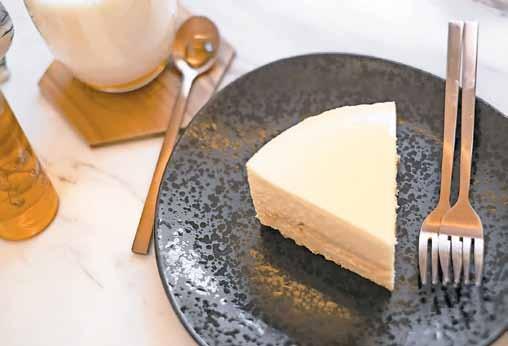
sugar until fluffy. Add the eggs, carrots, lemon juice, ginger and raisins (if using).
Stir in the flour, about 1/2 cup at a time. Add the baking powder, soda and salt with last addition.
Transfer the mixture into the prepared baking pan.
Bake in preheated oven 35 to 45 minutes or until a toothpick inserted in center comes out clean.
Serve hot or at room temperature. If serving a dairy meal, top with a scoop of ice-cream.
Theresa’s Ricotta Cheese Cake (Dairy)
Serves 15-18
Cook’s Tips: •Drain the ricotta cheese through cheesecloth if liquidy or very wet. •Prepared pie-crust pastry may be used instead of graham-cracker crust.
Ingredients:
• 2 to 3 Tbsp. butter
• 1/3 cup of graham-cracker crumbs
• 8 large eggs, separated
• 2 cups sugar, divided
• 3 lb. ricotta cheese, drained
• 1/2 cup all-purpose flour, sifted
• grated rind of 1 lemon (optional)
• 1 tsp. vanilla
• 1/2 cup cream, whipped stiffly
Directions:
Preheat oven to 425 degrees. Grease a 12inch springform pan generously with butter. Sprinkle graham-cracker crumbs over top. In a large bowl, whisk the egg whites with a half-cup of sugar until stiff. Set aside. In a separate bowl, beat ricotta until smooth, gradually adding remaining 1-1/2 cups sugar and the egg yolks. Beat well after each addition. Add the flour, lemon rind (if using) and vanilla, beating well.
Fold in the whipped egg whites and cream into the ricotta mixture. Transfer to the prepared pan. Bake in preheated oven for 10 minutes.
Lower the temperature to 350 degrees and bake for 1 hour. Turn off the heat and allow the cheesecake to cool in the oven with the door closed.
Serve with strawberries or fruit compote on top.
Ethel G. Hofman is a widely syndicated American Jewish food and travel columnist, author and culinary consultant.
Write: Columnist@TheJewishStar.com
Top Israeli mosaic goes on display in the Negev
A 1,600-year-old mosaic said to be “one of the most impressive” ever discovered in Israel has gone on public display in the Negev desert, the Israel Antiquities Authority announced.
The colorful mosaic, which was discovered in a monastery 35 years ago south of Kibbutz Urim near the border with the Gaza Strip and recently underwent conservation, is now being showcased for the first time in the Merhavim Regional Council’s headquarters in southern Israel.
The Be’er Shema (Birsama) mosaic includes 55 medallions decorated with scenes of hunting, animals and everyday life, was dated to the Byzantine period (324-638 CE).
“This beautiful mosaic, a living testimony to life that existed in the Negev some 1,500 years ago, will be preserved here and become a focal point for visits and learning — for tourists, students, and residents from across the country,” said Merhavim Regional Council head Shay Hajaj.
The impressive work of art is being made public in southern Israel nearly 20 months after thousands of Hamas-led terrorists stormed the area, killing 1,200 people, mostly civilians, and abducting some 250 hostages back to Gaza in the single worst attack against the Jewish people since the Holocaust.
“Especially these days, it is of great importance to reveal historical gems in the Gaza border region, such that they will be visitor attractions and increase traffic to this vital area,” said Israel Antiquities Authority director Eli Escusido.
“This new site will serve the public as an open archaeological garden.”
Noting that explanatory signs, an access road and seating areas had been integrated into the site, Escusido invited the public “to form their own impressions of one of the most beautiful mosaics ever seen here in Israel’s south, here in the northwestern Negev.” — JNS
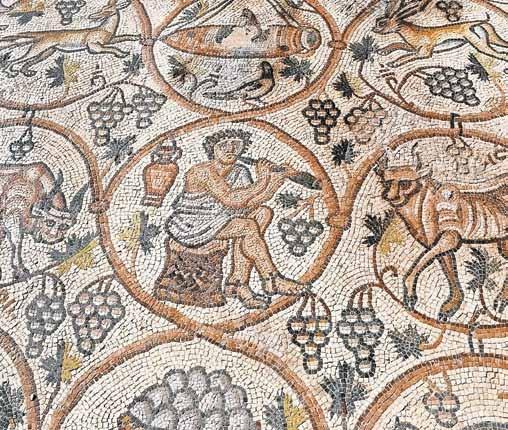




MAGA pretenders siding with ‘Death to America’ Iran against Pres. Trump
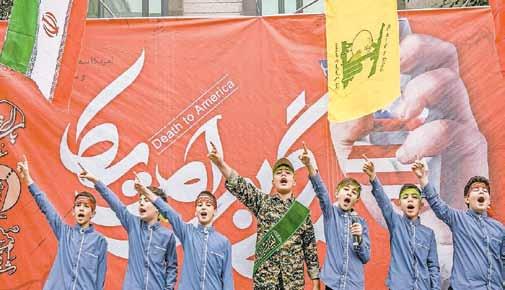

Hijacking President Donald Trump’s slogans of “America First” and “MAGA,” a neo-isolationist grift — led by hucksters and haters and fraudsters and fools — is trying to convince Americans that real patriotism means abandoning America’s interests while America is under attack.
Trying to be clever and edgy, social media influencers such as Tucker Carlson and Candace Owens and Nick Fuentes have been abusing “America First” to push the oldest antisemitic libel in the book (literally – bad guys have been making this claim since Genesis): Jews are disloyal warmongers.
But here’s the reality they’re desperate to ignore: America is already under attack. And right now, it is the Jews — Israel’s Jews — who are doing most of the fighting and dying for America.
Let’s stop pretending this is some ancillary foreign policy debate about whether or not or how much America should “help an ally.” This is an existential American moment and Israel isn’t asking America to fight its war. Israel is waging America’s war.
The Iranian regime swears “Death to America,” builds ICBMs that can strike Washington, and dispatches militias to kill American soldiers and Israel stands in the breach. It is confronting the proxies. It is providing the intelligence. It is targeting the terror networks. It is sabotaging the nuclear program. And it is taking the hits.
The real America First — the one defined by Trump — is about protecting American lives, American sovereignty, and American civilization. It is about obliterating the threats to our existence before they reach our soil.
Trump’s message could not be clearer. On Oct. 28, 2023, shortly after the unspeakably savage Oct. 7, 2023, invasion of Israel by Iran’s jihadi proxies, Trump declared:
The United States and Israel represent the pinnacle of Western civilization — which is exactly what these people want to destroy. … The survival of Israel is not just a foreign policy issue. It’s a moral issue. It’s a civilization-defining issue.
That is the moral clarity of the real America First. That is an articulation of American Greatness. And it stands in total opposition to the
poison peddled by Tucker and his ilk.
They say Iran isn’t our problem. They say Israel is the aggressor. They say American intervention is a mistake. And to justify their absurdity, they have been forced to go even further into a form of denial and depravity that recasts World War II as a Jewish manipulation, downplays Hitler’s evil and threat, portrays the Nazis as victims, and declares the Greatest Generation fools — or villains.
That’s not America First. That’s not American Greatness.
It’s the Squad, Defund the Police, Hamas and the KKK in a MAGA hat.
It’s no coincidence that their “foreign policy” is indistinguishable from the “Globalize the Intifada” radical Left’s. From DSA to BLM to Tehran Tucker, the message is the same weaken America; blame Jews.
Something grotesque is happening on the American
right.
This is not restraint. It is surrender. This is not realism. It is betrayal. This is not even isolationism. It is suicide. It is treason.
Iran is the world’s leading state sponsor of terrorism. Its agents and proxies have murdered hundreds of Americans. Its drones and missiles have struck U S bases and strategic assets. It has plotted multiple assassinations of American officials, including the president. And the weapons delivery systems it’s building now — the ones being pummeled by Israel, are designed not to reach Israel, but to reach America.
Israel has two goals in this war: destroy Iran’s nuclear capabilities and topple Iran’s terrorist regime. Anyone who puts America First shares those goals.
If you want a glimpse at what is at stake if Iran gets nukes and the ability to deliver them to the continental United States, read “Grid Down: Death of a Nation“ — the Congressional Task Force on National and Homeland Security report. Spoiler — It means total collapse of the American Republic. Here are a couple of nuggets: •A nuclear EMP attack is an “existential threat that could kill 9 of 10 Americans through starvation, disease, and societal collapse.”
See Ballabon on page 27
Mount Sinai South Nassau is Improving Health Care on the South Shore
The new Fennessy Family Emergency Department at Mount Sinai South Nassau doubles the size of our previous emergency department, o ering 54 private exam rooms with clear lines of sight for physicians, nurses, and support sta . Our new emergency department also o ers a separate triage area, dedicated areas for children and behavioral health patients, and has been designed to reduce wait times and improve patient outcomes.
The Fennessy Family Emergency Department is located within the new Feil Family Pavilion, opening later this year, which will have 40 new critical care suites and nine new operating rooms, designed to support the most complex surgeries on the South Shore.
To learn more visit www.mountsinai.org/feilpavilion



Jewish Star Torah columnists: •Rabbi Avi Billet of Anshei Chesed, Boynton Beach, FL, mohel and Five Towns native •Rabbi Binny Freedman, rosh yeshiva of Orayta, Jerusalem •Dr. Alan A. Mazurek, former ZOA chair, is a retired neurologist, living in Great Neck, Jerusalem and Florida.
Contributing writers: •Rabbi Sir Jonathan Sacks zt”l, former chief rabbi of United Hebrew Congregations of British Commonwealth •Rabbi Dr. Tzvi Hersh Weinreb, OU executive VP emeritus •Rabbi Yossy Goldman, president of the South African Rabbinical Association.
Contact our columnists at: Columnist@TheJewishStar.com
תבש לש בכוכ
Fri June 20 / 24 Sivan
Sh’lach
Five Towns candles: 8:11 • Havdalah: 9:20
Scarsdale candles: 8:12 • Havdalah: 9:22
Fri June 27 / 1 Tamuzx
Korach
Five Towns candles: 8:11 • Havdalah: 9:20
Scarsdale candles: 8:13 • Havdalah: 9:22
Fri July 4 / 8 Tamuz
Chukat
Five Towns candles: 8:11 • Havdalah: 9:19
Scarsdale candles: 8:12 • Havdalah: 9:21
Fri July 11 / 15 Tamuz
Balak
Five Towns candles: 8:08 • Havdalah: 9:17
Scarsdale candles: 8:10 • Havdalah: 9:18
Five Towns Candlelighting: From the White Shul, Far Rockaway, NY
Scarsdale Candlelighting: From the Young Israel of Scarsdale, Scarsdale, NY
The real world: That’s where we live our lives
rabbi Sir JonaThan SaCkS zt”l

The episode of the spies has rightly puzzled commentators throughout the centuries. How could they have gotten it so wrong? The land, they said, was as Moses had promised — “flowing with milk and honey.” But conquering would be impossible.
The people who live there are powerful, and the cities fortified and very large. We even saw descendants of the giant there. … We can’t attack those people; they are stronger than we are. … All the people we saw there are of great size. We saw the titans there. … We seemed like grasshoppers in our own eyes, and so we seemed in theirs.
(Num. 13: 28-33)
They were terrified of the inhabitants of the land, and entirely failed to realize that the inhabitants were terrified of them. Rahab, the prostitute in Jericho, tells the spies sent by Joshua a generation later: “I know that the L-rd has given you this land and that a great fear of you has fallen on us, so that all who live in this country are melting in fear because of you. … Our hearts melted in fear and everyone’s courage failed because of you, for the L-rd your G-d is G-d in heaven above and on the earth below.” (Joshua 2:10-11)
The truth was the exact opposite of the spies’ report. The inhabitants feared the Israelites more than the Israelites feared the inhabitants. We hear this at the start of the story of Bilaam:
“Now Balak son of Zippor saw all that Israel had done to the Amorites, and Moab was terrified because there were so many people. Indeed, Moab was filled with dread because of the Israelites.” Num. 22:2-3
Earlier the Israelites themselves had sung at the Red Sea:
The people of Canaan will melt away; terror and dread will fall on them. Ex. 15:15-16
How then did the spies err so egregiously?
•Did they misinterpret what they saw?
•Did they lack faith in G-d? Did they — more likely — lack faith in themselves?
Or was it simply, as Maimonides argues in The Guide for the Perplexed, that their fear was inevitable given their past history? They had spent most of their lives as slaves, only recently acquiring their freedom. They were not yet ready to fight a prolonged series of battles and establish themselves as a free people in their own land. That would take a new generation, born in freedom. Humans change, but not that quickly.
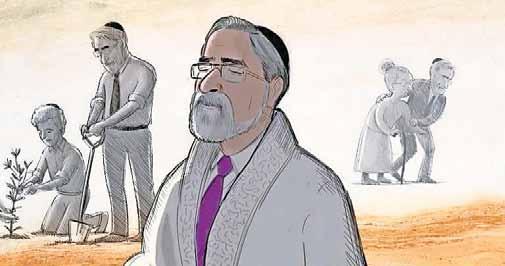
Most of the commentators assume that the spies were guilty of a failure of nerve, or faith, or both. It is hard to read the text otherwise.
However, in the Hassidic literature — from the Baal Shem Tov to R. Yehudah Leib Alter of Ger (Sefat Emet) to the Lubavitcher Rebbe — an entirely different line of interpretation emerged, reading the text against the grain to dramatic effect so that it remains relevant and powerful today.
According to their interpretation, the spies were well-intentioned. They were, after all, “princes, chieftains, leaders” (Num. 13:2-3). They did not doubt that Israel could win its battles with the inhabitants of the land. They did not fear failure; they feared success
Their concern was not physical but spiritual. They did not want to leave the wilderness. They did not want to become just another nation among the nations of the earth. They did not want to lose their unique relationship with G-d in the reverberating silence of the desert, far removed from civilization and its discontents.
Here they were close to G-d, closer than any generation before or since. He was a palpable presence in the Sanctuary in their midst, and in the Clouds of Glory that surrounded them. Here His people ate manna from heaven and water from the rock and experienced miracles daily.
So long as they stayed in the desert under G-d’s sheltering canopy, they did not need to plough the earth, plant seeds, gather harvests, defend a country, run an economy, maintain a welfare system, or shoulder any of the other earthly burdens and distractions that take peoples’ minds away from the Divine.
The spies’ concern was not physical but spiritual. They did not fear failure, they feared success.
Here, in no-man’s-land, in liminal space, suspended between past and future, they were able to live with a simplicity and directness of encounter they could not hope to find once they had re-entered the gravitational pull of everyday life in the material world. Paradoxically, since a desert is normally the exact opposite of a garden, the wilderness was the Israelites’ Eden. Here they were as close to G-d as were the first humans before their loss of innocence.
If that comparison is too discordant, recall that Hosea and Jeremiah both compared the wilderness to a honeymoon. Hosea said in the name of G-d: “I am now going to allure her; I will lead her into the wilderness and speak tenderly to her” (Hos. 2:16), implying that in the future G-d would take the people back there to celebrate a second honeymoon.
Jeremiah said in G-d’s name, “I remember the devotion of your youth, how as a bride you loved me and followed me through the wilderness, through a land not sown” (Jer. 2:2). For both prophets, the wilderness years were the time of the first love between G-d and the Israelites. That is what the spies did not want to leave.
Clearly this interpretation is not the plain sense of the narrative, but we should not dismiss it on that account. It is, as it were, a psychoanalytical reading, an account of the unconscious mindset of the spies. They did not want to let go of the intimacy and innocence of childhood and enter the adult world. Sometimes it is hard for parents to let go of their children; at others it is the other way round. But there must be a measure of separation if children are to become responsible adults. Ultimately the spies feared freedom and its responsibilities.
But that is what Torah is about.
Judaism is not a religion of monastic retreat from the world. It is supremely a religion of engagement with the world. The Torah is a template for the construction of a society with all its gritty details: laws of warfare and welfare,
harvests and livestock, loans and employeremployee relationships, the code of a nation in its land, part of the real world of politics and economics, yet somehow pointing to a better world where justice and compassion, love of the neighbor and stranger, are not remote ideals but part of the texture of everyday life.
G-d chose Israel to make His presence visible in the world, and that means that Israel must live in the world
To be sure, the Jewish people were not without their desert-dwellers and ascetics.
The Qumran sect known to us from the Dead Sea Scrolls was such a group.
The Talmud speaks of R. Shimon bar Yochai in similar terms. Having lived for thirteen years in a cave, he could not bear to see people engaged in such earthly pursuits as ploughing a field. Maimonides speaks of people who live as hermits in the desert to escape the corruptions of society (Laws of ethical character, 6: 1; Eight Chapters, ch. 4).
But these were the exceptions, not the rule. This is not the destiny of Israel, to live outside time and space in ashrams or monasteries as the world’s recluses. Far from being the supreme height of faith, such a fear of freedom and its responsibilities is — according to both the Gerer and Lubavitcher Rebbe — the sin of the spies.
There is a voice within the tradition, most famously identified with R. Shimon bar Yochai, that regards engagement with the world as fundamentally incompatible with the heights of spirituality. But the mainstream held otherwise.
Torah study without an occupation will in the end fail and lead to sin (Avot 2:2).
“One who makes his mind up to study Torah and not to work but to live on charity, profanes the name of G-d, brings the Torah into contempt, extinguishes the light of religion, brings evil upon himself, and deprives himself of life hereafter” (Maimonides, Laws of Torah Study 3:10).
The spies did not want to contaminate Judaism by bringing it into contact with the real world. They sought the eternal childhood of G-d’s protection and the endless honeymoon of His all-embracing love.
There is something noble about this desire, but also something profoundly irresponsible that demoralized the people and provoked Gd’s anger.
For the Jewish project — the Torah as the constitution of the Jewish nation under the sovereignty of G-d — is about building a society in the land of Israel that so honours human dignity and freedom that it will one day lead the world to say, “Surely this great nation is a wise and understanding people” (Deut. 4:6).
The Jewish task is not to fear the real world but to enter and transform it. That is what the spies did not understand. Do we — Jews of faith — understand it even now?
Spy stories: Not what we see, it’s how we see it

In 1940 as Jews were being herded into the ghettos of Nazi-occupied Europe and Hitler’s hierarchy was meeting to determine the “final solution to the Jewish problem,” a small group of pioneers was preparing the groundwork for what they believed would be the influx of refugees who would need a home and a place to call their own.
Where
It is hard to imagine the vision required for a group of Jews in 1940 to believe that there was a need to create new towns and villages in the barren lands that were years away from becoming the State of Israel, but these young men and women believed, against all the odds, that they were on the threshold of the fulfillment of a 2,000 year old dream and that the Jewish people were ready to begin coming home.
The infamous British “White Paper” severely limiting Jewish immigration to the land of Israel was in full force, and a scant 7,500 Jews from the millions desperate to get out of Europe would be allowed into a country surrounded by hostile Arabs and facing a heavy-handed British mandate resistant to their efforts.
They discovered that the land was filled with boulders and hard rock; completely untamable, the experts said. The winters were harsh, often making the meager roads impassable, and they found themselves between the very large Arab populations of Beit Lechem in the North and Hebron in the South. They saw the ancient Roman ruins; the caves, where tens of thousands of Jews
had been forced to live in hiding, remained. Against all the odds, the Etzion Bloc, four Jewish villages in the Judean hills, was born. They cleared the boulders with their hands, hauling dirt and rock with donkeys and leaving their families for an entire year, having decided that the land and the climate were too treacherous and difficult for mothers and children to join as yet. Where others saw only rocks and weeds, they saw a vibrant and living Jewish community in a modern State of Israel.
They were mad, of course, but they were right, and today a four-lane highway with the largest bridge and tunnel system in Israel, connects nearly 30,000 people in the Gush Etzion and Hebron areas to Jerusalem, a mere 15-minute drive away. And this dream, along with all the other dreams that make up the totality of what is today the State of Israel, began with a small group on a fact-finding mission to spy out the land that they would one day call home.
This week’s portion, Sh’lach, is about just such a mission, which took place over 3,000 years ago, when a small band of men set forth
from the desert to see if the land their ancestors had left behind so long ago could become once again, their home.
Only this time, it didn’t quite work out that way — or did it?
Nearly the entire portion this week speaks of this fateful mission, known as the “sin of the spies.” From the decision to send them out, to the description of what their mission was meant to be, to their return and the seemingly disastrous report they gave, this week’s portion is about a mission to spy out the land, which seems to have culminated in disaster.
The strangest part of this story is why the mission needed to take place at all.
There was a second famous spy-mission which the rabbis chose as this week’s haftorah.
The Jewish people are again on the verge of entering the land of Israel, after 40 years of wandering in the desert. Only this is the second generation, most of whom were born in freedom and are thus no longer burdened with the mentality of a slave generation.
In both Torah and in life today, history repeats

History repeats itself. I don’t know the origin of that cliché, but I do know that our Sages held a similar point of view — Ma’aseh avot siman labanim (what happened with ancestors is often a pattern that their descendants are destined to follow.)
The repetitive nature of historical processes seems to be true in the stories of all nations and cultures. This is why historians such as Arnold Toynbee believed that history is cyclical, and they have been able to demonstrate that certain central issues recur repetitively in the history of the human race.
I remember reading, in one of Toynbee’s books, of how the lives of many world leaders are characterized by patterns of “withdrawal
and return.” Thus, for example, Moses went through a period of withdrawal in the desert of Midian and then returned to Egypt to lead his people out of slavery. Similarly, great figures in the history of Greece, of Rome, of medieval Europe, and of modern Western civilization endured periods of their lives when they were in prison or in other forms of voluntary or forced solitude, and were thus in a stage of “withdrawal.”
They then reemerged on the stage of leadership of their people, thereby entering a stage of “return.”
In this week’s Torah portion, Shelach, a pattern is laid down which has been, tragically, repeated all too frequently in the history of our people. I speak of the pattern whereby a major portion of the Jewish leadership is opposed to entering the Land of Israel. Only a small and courageous minority says, “We should go up at once, and possess it; for we are well able to overcome it.” (Numbers 13:30)
This week, we read of the episodes of the

As we watch the rockets fall, the explosions, the destruction, the loss of life and injury, our hearts ache for our fellow Jews in Eretz Yisrael just as they cheered the devastating blows Israel landed on Iran and its nuclear threat.
But as we sit here in America, what can we do?
The familiar dictum, “Teshuva, tefilla, u’tzedaka maavirin et roa hagezera (Repentance, prayer and charity avert the evil decree,)” that we recite on Rosh Hashanah and Yom Kippur comes to mind. Add to that the performance of other mitzvot and fully engaging in ahavat achim (love of our fellow Jew).
And beyond giving tzedakah, there is one more requirement: kibbutz galiyot (the ingathering of the Jewish people to the land of Israel).
Look at the text of the amida prayer. After we respectfully request an audience with the King of the Universe, to make our supplications by invoking the zechut avot (the merit of our forefathers),
we declare the Holiness of G-d and His name.
We then begin our requests, first for bina (insight or knowledge), then teshuva (repentance,) then selicha (forgiveness), followed by the requests for geulah (redemption), refuah (healing), birchat hashanim (prosperity), and kibbutz galiyot (the gathering of the exiles from the four corners of the earth.)
These all appear to be passive requests; we are beseeching G-d to grant them to us.
But in actuality, each one requires effort on our part.
We don’t get bina without Torah study. We don’t perform teshuva without our acknowledgment of wrongdoing and a decision to change, at which point we would receive selicah (G-d‘s forgiveness).
Note that all these brachot are bakashot (requests) and form a progression, one leading to another.
After selicha comes geulah (redemption) which is actually a request for G-d’s assistance in healing our rifts as well as the daily oppression from our enemies in exile — but we have to do the heavy lifting of ahavat achim Refuah follows, and though Hashem is the ultimate healer, he wants us to go to the doctor (“v’rapo yerapeh,”Shmot 21:19), with birchat hashanim (seasonal prosperity) coming only if we put in the work in the fields.
spies. These men were a select group of talented and presumably pious individuals. They conducted their risky mission as it was assigned to them. They were to explore the Promised Land and determine the nature of its inhabitants and the nature of the terrain. This was, simply put, a preparation for entering the land, conquering it, and settling it once and for all. But 10 of the 12 returned totally discouraged. I would say, literally discouraged; that is, their courage was undone. They said, “We are not able to go up against the people, for they are stronger than we.”
The spies weren’t the last time that Jewish leadership was torn apart by discord.
But then seemingly out of order comes kibbutz galiyot (ingathering of exiles). Shouldn’t that be before geulah? One explanation offered by Chazal is that the first geulah prayer is for physical redemption from the daily oppressions of everyday life while the second geulah is the spiritual redemption, bringing us to the Holy Land.
But shouldn’t it be the other way around? Shouldn’t our spiritual deliverance come first?
In fact the latter kibbutz galiyot implies a physical act of being picked up and moved to Eretz Yisrael. Furthermore, if so, then it appears that this is one request that seemingly Hashem must grant to us all on His own, without effort on our part!
The answer, of course is that all these requests require our active participation, our efforts, a partnership if you will with Hashem. “You’ve got requests?” Hashem says to us, “then do your part.”
We can’t just sit back and wait for Hashem to scoop us up and deposit us gently and safely in the Holy Land. Even if going for a visit, we have to buy a ticket!
Like everything else in the Shmoneh Esrei, payer is not enough — we must make kibbutz galiyot happen. That means that, if we can, we should buy property or a home in Israel, even if
This was only the first, but definitely not the last, time in Jewish history that Jewish leadership was internally torn apart by discord. The event described in this week’s Torah portion is but the first precedent of a recurring pattern in which a few heroic visionaries, Joshua and Caleb, can commit not only to enter the land themselves, but to inspire their followers to do so. But these visionaries, alas, are only part of the pattern. The other part are those leaders who are too cowardly, too cautious, or too blind to lead their people to do all that is necessary to enter and to possess the Holy Land.
During the Babylonian Exile, only unique individuals like Ezra and Nehemiah were made of the same stuff as Joshua and Caleb. And only a small remnant of the Babylonian Exile followed them and returned to the land. The great majority of Jews and the great majority of the Jewish leaders remained behind in Babylon, ignominiously.
So frequently over the ensuing centuries did
earth
we can’t move there now or soon. (And believe me you won’t be sorry. Your investment will go up many fold. You buy for your neshama and G-d makes sure your pocketbook grows.) If not buy, then rent. We must start actively thinking, feeling and talking about moving to Eretz Yisrael.
Now, as we minute by minute, identify with the terror and pain felt by our brethren there, and their joy and elation when they succeed, we at the same time, are painfully aware of the physical and spiritual dangers in the galut, even here in the United States. We must fulfill our part of this request.
We and our families must have the urge, the thought, the overpowering desire to make that move and now have that conversation. Im lo achshav ematai (if not now, when)? Shabbat shalom.
Dr. Alan A. Mazurek is a retired neurologist, living in Great Neck, Jerusalem and Florida. He is a former chairman of the ZOA.
TheJewishStar.com
Honest Reporting • Torah-True • Kosher and Fat-Free
Published weekly except during certain religious and civil holidays by The Jewish Star LLC New York City office: 5676 Riverdale Ave Suite 311, Bronx NY 10471 • LI office: 2 Endo Blvd, Garden City NY 11530
Here’s how to reach The Jewish Star — Write: Editor@TheJewishStar.com. Call: 516-622-7461 ext 291
Editor & Publisher: Ed Weintrob
516-622-7461 ext 291
Jewish Star Associate: Nechama Bluth
516-622-7461 ext 241
Content: The Publisher endeavors to ensure that our content is within the bounds of normative halachah and hashkafah. Anyone who feels anything we publish may be inappropriate in this regard is urged to bring the item in question to the attention of the Publisher.
Advertising is accepted at the sole discretion of the Publisher and should conform to standards appropriate for distribution in an Orthodox community.
Send us your news! Editor@TheJewishStar.com
Advertising: Publisher@TheJewishStar.com
Kashrut: The Jewish Star is not responsible for the kashrut of any product or establishment featured in its pages. If you have questions regarding any establishment or product, including its supervision, please consult your rabbi for guidance.
Submissions: All submissions become the property of The Jewish Star and may be edited and used by the Publisher, its licensees and affiliates, in print, on the web and/or in any media that now exists or will exist in the future in any form, including derivative works, throughout the world in perpetuity,
without additional authorization or compensation. The individual or entity submitting material affirms that it holds the copyright or otherwise has the right to authorize its use in accordance with The Jewish Star’s terms for submissions.
Opinions: Views expressed by columnists and other writers do not necessarily reflect the position of the Publisher or of The Jewish Star LLC.
Distribution: The Jewish Star is available free in kosher food establishments, stores, synagogues, and curb-side newsboxes on Long Island, in New York City and elsewhere. To request free delivery to your location, write Publisher@TheJewishStar.com.
Copyright: All content is copyright and may not be republished or otherwise reproduced without written permission by The Jewish Star LLC; to do so without permission is against the law and halacha. For content reproduction write to Publisher@ TheJewishStar.com.
The Jewish Star subscribes to the JNS news service. It, or its contributors, own the copyrights on material attributed to them. The length and content of JNS material and all other submitted material may be edited by The Jewish Star. This newspaper contains words of Torah. While it is not considered shaimos, please dispose of it properly.
From protest to terrorism: A well-trodden path

Historians will be familiar with the observation in Kohelet, the book of Ecclesiastes, about the repetitive cycles of past and present: “What has been will be again; what has been done will be done again; there is nothing new under the sun.”
This passage is especially resonant when it comes to antisemitism. The underlying libels — killing for blood in ritual use, treachery and treason, colonial theft against an indigenous population — may differ from generation to generation, but the manner of their expression remains essentially the same.
It’s unlikely that a single pro-Hamas protester knows about the antisemitic “Hep Hep” riots in Germany 200 years ago, in which students played a prominent part. But those were triggered by the rejection of Jewish civil emancipation, just as the harassment of Jewish students on campuses today is triggered by outrage against Jewish national self-determination.
“Hep Hep” was the rallying cry then; “We don’t want no Zionists here” is the rallying cry now.
Perhaps the most consistent feature of all is violence. Violence against Jews is the culmination that the messengers of antisemitism, tired of rhetorical quarrels and pleading for “action,” seek.
Some say so plainly. There are many more too cowardly and disingenuous to do so, but who justify violence as an inevitable and legitimate response to the alleged crimes of the Jewish state and the mass of Jews outside who identify with it. The question was never if the pro-Hamas movement that has disfigured our country would itself turn to violence, but when
In the last two months alone, we have seen the attempted murder by fire of Pennsylvania Gov. Josh Shapiro and his family, the cold-blooded shooting deaths of a young Jewish couple who worked for the Israeli embassy in Washington, and the firebombing of a rally for hostages held by Hamas in Boulder, Colo., all carried out in the name of “Palestine.”
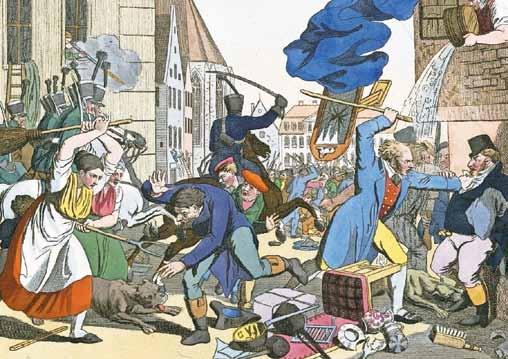
As Americans try to figure out how and why this continues to happen, not least for the sake of a more effective response, relatively recent history remains a useful guide.
Enter Wilfried Böse.
Again, most people, including those cosplaying with keffiyehs, will have no idea who Böse was, but he’s deeply relevant to what’s happening now. Codenamed by his revolutionary comrades as “the Little Fat One,” Böse was born in Germany not long after the defeat of the Nazis. Like many Europeans of his generation, he was an enthusiastic participant in the student protests of 1968. As the New Left’s fantasies of seizing power faded in the early 1970s, he joined other German radicals in the underground left-wing terrorist movement.
Böse underwent guerrilla training in Yemen, provided not by the Houthi rebels of our time but the now-defunct Marxist republic of South Ye-
The question was never if the pro-Hamas movement would itself turn to violence, but when. Our blood may be flowing, but we cannot let them win.
men. In 1976, he led the hijacking orchestrated by the Popular Front for the Liberation of Palestine of an Air France jet flying from Tel Aviv to Paris via Athens, where the terrorists boarded. The plane eventually ended up at Entebbe Airport in Uganda, at the time ruled by the monstrous dictator Idi Amin Dada. Once there, Böse and his squad separated the Israeli passengers from the non-Israelis in a scene that reminded many who witnessed it of the “selektion” process for new arrivals at Nazi concentration camps only three decades earlier.
Had Israel not launched its famous “Raid on Entebbe,” rescuing the Air France hostages, they would likely have been executed by their captors, who were directed by the same Palestinian terrorist groups responsible for the massacre of Israeli athletes at the Munich Olympics in 1972. In the end, it was Böse who was killed, along with the other terrorists, by the Israeli liberators.
When I look at the Washington gunman, Elias Rodriguez, I see the spirit of Wilfried Böse. Like Böse, Rodriguez, on the evidence of his scattered writings, is possessed of a mediocre intellect, diligent at studying and parroting the doctrines of the pro-Hamas movement but utterly incapable of questioning them. Like Böse, Rodriguez does not shy away from extreme
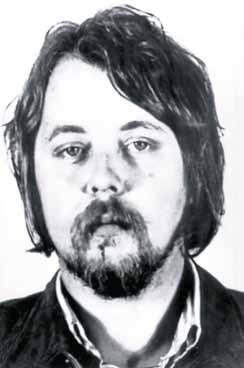
violence and murder; indeed, the fact that he reloaded his pistol to fire more bullets into 26-yearold Sarah Milgrim as she crawled away from him suggests that he gets a kick out of both.
Like Böse, Rodriguez also has an ego, and his act of murder has turned him into a folk hero on parts of the left.
This last point is somewhat ironic because in Marxist social theory, the role of the individual in the historical process doesn’t matter very much. History’s ebb and flow is the product of class struggle — the outcome of competing social forces locked in a dialectical battle. Victory or defeat is determined by the type of social formation that emerges from that clash, not the personal experiences of the participants.
But for all its professed radicalism, the far left emotionally identifies with an aristocratic, romantic view of history in which an individual armed with sufficient grit and determination can light the proverbial spark that will change the world. Mix that in with some seriously warped moral values that allow you to celebrate the murder of a couple in their 20s, and you can understand why Elias Rodriguez exercises such an attraction. (Those unable to pick up a gun can always follow the example of his ideological comrade, the Boulder firebomber Mohamed Soliman, and use a homemade weapon instead.)
Report from Israel: Blood, bravery and brit milah
RABBI HAYIM LEITER
Letter from Efrat

Ioften feel like the “A-team” of rabbis: “If you have a problem and you can find me, maybe I can help.” I don’t operate out of a synagogue; I’m a spiritual freelancer in Israel — officiating weddings, guiding conversions, and most often performing brit milah. That freedom allows me to bypass politics and focus on what truly matters: helping people.
The week began with a wedding in central Israel, followed by five circumcisions. Then Israel went to war with Iran.
On the eve of the strike, I was called up north to perform a brit. As I arrived at the event hall, I noticed that many of the men, including the baby’s father, had the same buzz cut, though I didn’t think much of it. Just before the prayer for Israel’s soldiers was recited, a fighter jet roared overhead. I later learned the baby’s father was a pilot, living with his family on the base just down the hill.
At 3 am, sirens rang out. My family and I ran to the bomb shelter. Israel had begun striking Iran’s nuclear sites.
As I roused a few hours later for the day’s events, we were all waiting for Iran’s retaliation.
In
Israel, life goes on, even if it feels like the sky might fall.
All citizens were required to stay near a bomb shelter until further notice. Israel had successfully incapacitated the facilities and eliminated most senior officials of the Iranian National Guard Air Force. There’s no way this would go unanswered, but Jewish circumcisions must be carried out on the eighth day, war or not.
The first was in Jerusalem. As I raced through the city, I passed an elderly man — easily in his 80s — standing calmly on a street corner. No panic, no shelter in sight. He had clearly seen worse.
Only the immediate family gathered in the small apartment. As I prepared the baby in the grandfather’s lap, the father choked up as he recited the prayer for the safety of our soldiers, “G-d, bless and protect our soldiers […] on land, air, or sea.” Moments later the baby’s great-uncle updated us: 100 drones were en route. I packed my things and headed to the next brit milah in Modi’in.
The second family was grateful I made the trip in spite of the situation. In Israel, life goes on, even if it feels like the sky might fall. The parents named their new son Shalev, a prayer for tranquility or peace. And for a moment, it seemed that the prayer might be answered. As the ceremony ended, I was tempted to stay for some food, but then my phone lit up: “Drones arriving within the hour.” My drive was 50 minutes. Once again, I ran out the door.
I raced home to be with my family and reach shelter in time. As I turned the last corner, the alert came: “End of stay next to a protected space.”
Could it really be over?
The Mossad had set up a drone base in Iran and struck down all of the surface-to-surface missile-launchers while the Israeli Airforce intercepted the Iranian drones before they en-
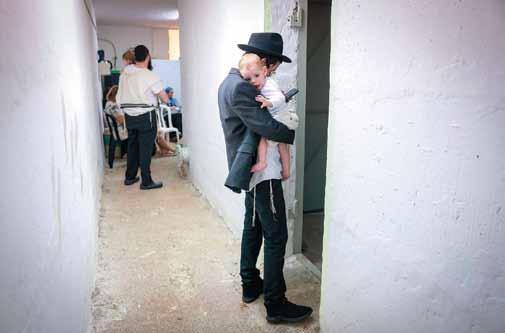
tered our airspace.
We live in miraculous times.
This initial success only lasted until Shabbat began. Just after we sat down for dinner, the sirens began again. For the first time since Oct. 7, we slept in our bomb shelter. It seems like this could be our reality for some time. While there, we, too, prayed for our soldiers and for all the citizens of Israel.
The second night of barrages was even more intense. It was declared a mass-casualty event, with at least 11 dead and 200 injured. These are both miraculous and trying times.
Most people who reach out to our family from around the world apologize for the situation. It’s true that none of this is easy. Half of our family was preparing to travel — my wife and son for a family wedding in the States, and I was meant to officiate one in Spain. As much as we are sad to miss these happy occasions, we understand that neutralizing the threat from Iran is of paramount importance. We only pray that the cost of achieving this goal has already been paid.
At some point along the way, I checked in with the mother from northern Israel to see how
Journeys to Israel more than a rite of passage

Israel is at war with Iran. Those looking to leave Israel for the United States and destinations around the world have found their flights canceled. So, too, have those wanting to be in Israel. Thousands are affected.
Each year, thousands of American Jewish families pack suitcases, kiss their sons and daughters goodbye, and place them on planes bound for Israel. Some are headed for a gap year between high school and college, and others for immersive Torah study or a deepened connection to Judaism and the Jewish homeland.
It has become, for many, a rite of passage — rooted in faith, identity and belonging. Others come for summer programs of studying, volunteering and touring in a foreign country they think of as home.
In Israel, no matter what brings them, these young people live much like their Israeli peers. They ride the buses. They walk through shuks and shop at their local grocery store. They find favorite falafel stands and coffee shops, and learn to argue in Hebrew.
Some go further still, joining the Israel Defense Forces out of conviction, love of Israel or a sense of destiny. They take on the uniform not out of obligation but devotion.
Israel, however, is not Switzerland, as I told a parent 30 years ago as we waited at John F.
Kennedy International Airport in New York for our daughters to board a flight to Israel, adding that it’s also “not Uganda.” We know this. And tragically, sometimes, the risks become real.
Now, war once again rages. Sirens sound, everyone runs to shelter, rockets fall; there are casualties, and every parent’s heart sinks. In communities across the United States, Jewish parents check WhatsApp obsessively, glued to updates from Jerusalem and Sderot, Tel Aviv and the Galilee.
The instinct is primal: for parents with children in Israel now, bring them home. Get them out. For those with children heading to Israel for the summer, cancel the trip. Why should “our” children be caught in “their” war?
It’s a fair question. But we must respond with a deeper one: What are we teaching our children about the meaning of Jewish peoplehood, of Zionism, of responsibility and resilience if we evacuate them or don’t permit them to travel the moment Israel is tested?
Israel was never supposed to be just a summer program or a semester abroad. It’s not a theme-park version of Jewish identity. It is real life, and real life includes struggle. To learn in Israel is to live Judaism not as theory, but as practice. To love Israel is to embrace the nation only in times of song and sunshine, but in moments of sacrifice.
Israel is biblical prophecy come true, as the navi announced G-d’s promise: “Old men and women shall yet sit in the streets of Jerusa-
What do we teach them about Zionism, Jewish peoplehood, responsibility and resilience if we don’t permit them to travel when the nation is tested?

lem, each man with his staff in his hand because of old age. And the streets of the city shall be filled with boys and girls playing in its streets.”
This is not a call for recklessness. Safety matters. Programs must make responsible decisions, and individual families should act in consultation with educators and professionals. Still, we must not let fear alone drive our choices. Our children come to Israel to learn — and this, too, is part of their education.
They are learning what it means to be part of a people that carries memory and mission, often in the face of enemies. They are learning what it feels like to pray in a bomb shelter and sing “Am Yisrael Chai” in defiance of terror. And they are
learning that being Jewish is not only about personal growth, but national commitment.
Most importantly, they get to understand that the Jewish story is still being written — and they are part of it. When he penned “Magesh HaKesef” (“The Silver Platter”) before the 1948 War for Independence broke out, Natan Alterman recognized this and concluded the poem, “and the rest will be told in the chronicles of Israel.”
This war will end. As all wars do. And when it does, I pray that on no one will tell their child, “You can’t go.”
Let us teach them that Israel is not only theirs in good times. Let us teach them that their pres-
Israel’s calling: Down with Iran, up with Persia

Once again, Israel is doing the heavy lifting for the rest of the world. It’s what Jews do.
Israel’s pre-emptive and technically accomplished strike on Iran is the stuff of legend. Given how close Iran was to nuclear weaponry, Israel could wait no longer. Our tiny homeland is always under siege, always defamed, always endangered. It is also the bravest country on Earth.
Israel is, truly, a miracle. How much is due to human genius, and how much does G-d play a hidden role? I really cannot say, but I began reciting psalms. The Israeli chief rabbis have suggested Psalms 20, 21 and 130. Despite everything, no matter Israel’s external enemies and the rift between Israelis, it is an honor to belong to such a people.
And now, some personal memories.
I was first in Iran/Persia/Shushan in 1961. Arrogant wealth co-existed with the most profound poverty, and yet, middle- and ruling-class women went about with bare heads, naked faces and wore expensive Western clothing. Over the years, I have written about that visit in articles and in “An American Bride in Kabul.”
Iran next came into my life when Reza Baraheni, an Iranian intellectual and then-head of
Israel’s strike on Iran is the stuff of legend. Let’s hope it leads to internal change for Iran.
Students Against the Shah, came to call. That was back in the mid-1970s. He told me that he’d been tortured; he moved around a lot, he yearned for the Shah’s downfall — and for “revolution.”
After Ayatollah Ruhollah Khomeini took power, Reza rushed back ecstatically to his home country. At first, he invited Kate Millett to lecture in Tehran on International Women’s Day. She gladly, foolishly, went. Khomeini arrested her. I was beside myself: How could we few Western feminists free her? Luckily, and strangely enough, Khomeini just let her go.
Reza then promptly invited me to speak on the next International Women’s Day. I told him that I had learned enough about a woman’s likely captivity when I was in Kabul and that I’d never come to Iran under the rule of the mullahs — at least, not without a full battalion of Marines, and every conceivable special-force operatives. At first, Reza was disappointed. Then he mocked me.
Within a few years, he, too, fled Iran for Canada. He was, after all, an Azerbaijani Turk. The mullahs were closing in on him and on any Marxist notions he may have held about secular “liberation.”
I encountered Khomeini’s very aggressive gangs of black female ghosts very soon, at a 1980 UN conference in Copenhagen. They were there to falsely accuse Israel of crimes, and they very happily made common cause with the Soviets and the Arab League against Israel and against America. I met their like again at a conference in New York City when I stood with the bravest Iranian and Afghan women, who called them out and actually shamed them into leaving the room.
Oh, how we all lived through the subsequent events — Khomeini’s kidnapping of American diplomats, their anti-woman and antidissident purges, arrests, tortures, murders, their hanging people from cranes, their raping of female prisoners before they executed them, their persecution of prostituted women, their murders of women who did not want to wear hijab or

whose hijab slipped a bit, their terrorization of an entire people.
Always, always, they talked about exterminating the “Big Satan” (that’s America) and the “Little Satan” (that’s Israel). They were very clear about this.
By 2003-2004, I was also very clear. Iran was the “head of the snake,” and together with Qatar, was the world’s major funder of terrorism and global Jihad. I said so. I wrote about this. I kept hoping that America — the greatest military power in the world — would stop such funding and end its nuclear program.
Despite countless attacks against American soldiers stationed in the Middle East, no American president has done this. Yes, President Ronald Reagan got the American embassy workers
in Teheran out, although President Jimmy Carter did not. In the 21st century, neither did Presidents George W. Bush, Barack Obama or Joe Biden. Over the years, I’ve been in touch with many Iranian women, such as Manda Ervin and her daughter, Banafsheh Zand. Ervin founded the Alliance of Iranian Women. She also wrote a book about the pre-Iranian Mother-Goddesses of Persia, titled “The Ladies’ Secret Society: The History of the Courageous Women of Iran.”
Manda’s husband was a political prisoner under the mullahs. He was tortured, perhaps driven out of his mind. Finally, he jumped out of a window. We all worked together at the First Islamic Dissident Conference in St. Petersburg and then again in Rome at a G8 conference.
In America, when the Jew is seen as a ‘settler’

The revolutionary forces currently playing out their subversive, violent strategy in America, as well as in some European countries, will repeat the experience Jews went through after the revolution took power in Russia a little more than a century ago. There are, however, two differences between the events.
Whereas in the first instance, the Bolsheviks were the sole “vanguard party,” a Leninist concept to describe a party that is built of an activist minority that strives to be seen as representing the interests of the whole while also suppressing other left-wing political organizations, today there exist multiple competing groups.
At this moment in time, will the anti-ICE agitators in cities around the United States exploit the environmentalists and climate changers, or will the pro-Palestinians maneuver those groups to serve the interests of anti-Zionism? In tsarist Russia, despite the splintering of the Marxists, they were quite well-focused. Overall, they were a programmatically homogeneous, revolutionary vanguard.
In the second instance, though, we Jews are, or should be, much smarter, having seen what that revolution, with its gulags and GUP and NKVD (the interior ministry and secret police of the Soviet Union from 1934 to 1946), and its Yevsektzia Jewish turncoats did to Jewish cultural, religious and national life.
I fear that while we should be, we aren’t, given the activities of IfNotNow, Jewish Voice
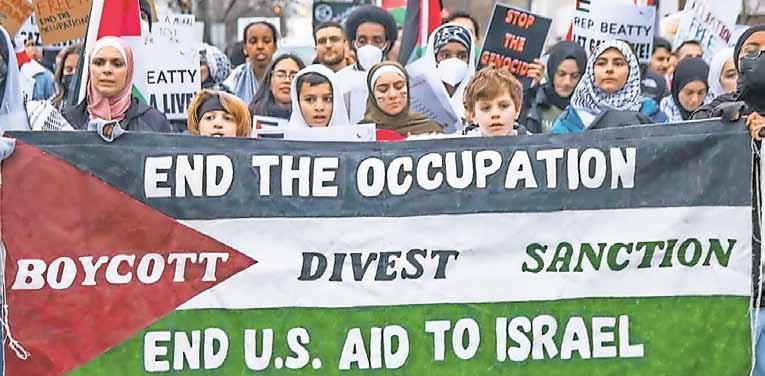
for Peace, Na’amod and the other radical progressive groups, as well as their encouragers like journalist Peter Beinart and author Naomi Klein, both anti-Israel activities, and the additional fellow-travelers.
There has been a newish antisemitism developing. As with the medieval apostates who fed the church authorities the untruths they needed, about the Talmud and Jewish ritual practices, to burn, pillage, and ultimately,
murder Jews for centuries, the modern-day version is stoking the fires of Jew-hatred based on their anathema to Jewish nationalism — that is, Zionism.
Consider Manny’s, a business in San Francisco’s Mission district, that’s not new to being pilloried. Back in 2019, it suffered a boycott campaign.
The neighborhood in which Manny’s was located was undergoing “gentrification.” Longtime residents were being forced out, their fam-
ily homes replaced by steel and cement condos, and expensive eateries with “artisan pastries.” They sought to “reclaim the land that the neighborhood has been forced to accede.”
To do that, they decided to boycott Manny’s. The owner, Manny Yekutiel, is a part-Afghani Jewish gay man, but he is also a self-proclaimed “Zionist.” And so, for a period, once a week, for an hour, activists of the Black and Brown for Jus-
The Stakes for Our Community Have Never Been Higher
Every election matters. Of course. But this one is different. For the first time, we face an existential threat.
• Only two candidates can win this Democratic Primary: Andrew Cuomo or Zoran Mamdani.
• Mamdani is backed by the DSA — a radical movement pushing to defund yeshivas, slash police, and vilify Isreal.
• After October 7, Mamdani blamed Isreal for the massacre. No mention of murdered Jews. That wasn’t a mistake — it was a declaration of values.
• The DSA calls our schools regressive, our values dangerous, our community an obstacle. This isn’t about inclusion — it’s about erasure.
• Cuomo is not a tzaddik. But this isn’t about liking him. We’re not choosing a rebbe — we’re choosing a shield.
• Yes, we remember the pain of 2020 red zones. But what’s coming is worse.
• Mayor Eric Adams is NOT on this ballot. A vote for anyone but Cuomo = a vote for Mamdani.
Please note that in ranked-choice voting, you are not required to rank more than one candidate, even if a poll worker tells you otherwise.
EARLY VOTING THRU SATURDAY JUNE 21
EARLY VOTING THRU SUNDAY JUNE 22
ELECTION DAY TUESDAY JUNE 24
Stay Home = Surrender Vote = Protect This is about Our safety, Our future in this city.
Far Rockaway Jewish Alliance
Elkana Adelman
Richard Altabe
Shalom Becker
Zvi Bloom
Jack Brach
Mordechai Zvi Dicker
Ruchie Dunn
Joel Kaplan
Dr. Moshe Lazar
Moishe Mishkowitz

Chaim Rapfogel
Baruch Rothman
Aaron Zupnik
Freedman…
Continued from page 21
Poised on the banks of the Jordan River (Devarim 34:1), the mantle of leadership passes to Joshua, who is given the chance to make it right. In the haftorah, taken from the second chapter of the book of Joshua, the Jewish people are again sending men to spy out the land. Joshua was one of the original spies and has firsthand experience of what a mistake that mission turned out to be, this demands an explanation.
A closer look reveals that the mission initiated by Joshua was very different from that of Moshe sent in the desert. Considering that this second mission was successful, the difference between these missions may help us understand what was behind them, and what they really accomplished.
Moshe sends 12 men, one from each tribe, and the Torah takes a lot of time describing who they are and their high positions. In fact, they were the Nesi’im, the Princes of the tribes, and are listed by name. Joshua, on the other hand, sends only two men, and the text never tells us who they are.
Moshe’s mission, from beginning to end, was very public. The people know they are going and are involved in the initial request to send them (Devarim 1:22), and the spies return to give a report before the entire congregation (Bamidbar 13: 26).
In the book of Joshua, however, the entire mission was top secret, and there was another difference. Moshe’s spies toured the entire land (Bamidbar 13: 27-29) for 40 days.
Joshua’s spies went only to Jericho, and did not even see the city itself as they were “discovered” before leaving the home of Rachav where they had just arrived (Joshua 2:2-3). After escaping from Rachav’s home (where she hid them on her roof on the night of their arrival) they went directly to the hills above Jericho (clearly visible from across the Jordan in the Israelite camp) where they hid for three days before returning directly to Joshua (2:22-23).
So in fact they saw absolutely nothing! What sort of spies were these? What exactly did they accomplish, and why did they bother going at all?
In Bamidbar, the spies of Moshe are never actually called spies. The Hebrew word for spies is meraglim, but these 12 men were called tarim (explorers). And despite the fact that the commentaries do describe them as meraglim, the text never does. In fact, their mission is described not as leragel, which would mean to spy, but rather latur (13:2), which really means to explore. In the book of Joshua, however, these men are not described as explorers but as meraglim (2:1), and their mission is not latur but rather lachpor, which means literally to dig, or to seek out (2: 2,3).
When Joshua sends his spies he is doing so as a military commander, so it is a secret mission, with a very clear and focused goal. Moshe, on the other hand, is trying to send a message to the Jewish people, which is why he sent nesi’im, the princes of the people. The people had heard the stories of Israel but they had never seen it, much less experienced it; they knew about it in their heads but they needed to feel it with their hearts.
Moshe commands them to “see the land: how is it?” (13:18); he wants them to see how wonderful the land is by experiencing it. This lesson was not lost on Joshua, who was one of the two (of 12) original spies who understood what Moshe his teacher was trying to say.
So, 40 years later, he does not need explorers to give this message over, nor does he need a command from G-d to begin the process. It is abundantly clear to him that if it is time to enter the land, he and the people along with him must be willing to fight for it.
Why did Joshua, need a mission at all? The only real information gleaned from the journey of his two spies to Jericho is that the people of Canaan are terrified of the Jewish people and of their G-d. Perhaps Joshua knew they would enter the land, and had no doubt they would conquer it; his question was, is it time? That the nations of Canaan so feared their coming, told him it was time for the Jewish people, at long last, to go home.
Ultimately, the story of the spies is not about what we see, but about how we choose to see it.
The princes, born in Egypt and coming of age in the slavery of Pharaoh, may not have been ready to see what being in a place like Israel was all about. But the second generation, living on a dream they had nurtured in the desert for 40 years, were ready to put what they had learned to the test.
If you were to ask those men on that rocky barren hilltop in the Hebron hills what they saw that made them decide it was time to come home, I doubt they could tell you. It wasn’t something they could explain, it was and is something you have to experience.
Shabbat shalom from Jerusalem.
Rabbi Binny Freedman is Rosh Yeshiva of Orayta in Jerusalem. A version of this column was previously published.
Write: Columnist@TheJewishStar.com
Weinreb…
Continued from page 21
history repeat itself. Every so often, a pitifully small group of Jews from Persia and Morocco, from France, from the bastions of Hasidism in the Ukraine or at the prodding of the Gaon of Vilna, follow the path advocated by Joshua and Caleb. Against all odds, they do return to the land. But the vast majority of their brethren, sometimes for practical reasons and sometimes for ideological ones, choose to remain behind in the Diaspora. They follow the path of the other ten spies.
Every portion in the Torah has relevance to contemporary Jewish life. This has been the theme of these columns which I have been writing now every week for years. But this week’s Torah portion is especially timely.
We live in an age where the ideal of return to Zion, which, after all, is the ideal preached so inspiringly by Joshua and Caleb, is beset by challenges from all sides.
We live in an age where the liberal intellectual community, composed to a great extent of fellow Jews, no longer accepts the ideal of a Jewish homeland for the Jewish people. At the very least, that community is willing to see the Holy Land shared by another people. And there are those of that community who totally delegitimize the notion of a return to Zion.
More troubling to me however are those elements of the observant religious community who are antagonistic to the enterprise of the Jewish people living as a sovereign nation in the land promised to us by the Almighty himself. I know full well that there are legitimate ideological views for or against religious Zionism, and I am certainly cognizant of the faults and flaws of the government of the State of Israel.
But I fail to see how anyone reading this week’s Torah portion cannot be impressed by its central messages:
•We left Egypt with a promise to inherit a specific land flowing with milk and honey.
•We had the opportunity to enter that land very soon after the Exodus.
•We failed to appreciate the opportunity and we lost it.
True, we didn’t lose it entirely, and it was only postponed for forty years; the blink of an eye from the perspective of the millennia of Jewish history.
The tragedy of Parshat Shelach transcends this one incident described there. Rather, the narrative of Parshat Shelach establishes a pattern which is repeated too often during our subsequent history: The conflict between foresight and fear, between courage and cowardice, between true faith and weaker faith, becomes an eternal theme in our history down to this very day.
I have come to learn, via the communications I receive from so many of you, dear readers, that you all listen quite attentively to each week’s Torah portion. I challenge you, especially this week, to listen attentively to the narrative of the spies. And when it is over, I am quite confident that you will see the message it sends to our generation. It is the message of Joshua and Caleb. It is the message that says to the entire congregation of the children of Israel:
“The land, which we passed through to spy it out, is an exceedingly good land. If the L-rd delight in us, then He will bring us into this land and give it unto us — a land which flows with milk and honey. Only rebel not against the L-rd, neither fear ye the people of the land; for they are bread for us; their defense is removed from over them, and the L-rd is with us; fear them not.” (Numbers 14:7-9)
Write: Columnist@TheJewishStar.com
Continued from page 22
There is a visible network encouraging others to follow the paths of Rodriguez and Soliman. It includes a Maoist faction within the Democratic Socialists of America — the home of politicians, including Rep. Rashida Tlaib (DMich.) and New York City mayoral candidate Zohran Mamdani — and “Unity of Fields,” a violently anti-Zionist activist group. The latter has even set up a website that honors Rodriguez with a radical chic rendering of his portrait alongside the words “For Gaza From Elias.”
“What we are asserting is more than a recognition that the violence and oppression meted out by the zionist (sic) movement will inevitably give rise to counter-violence, an indisputable truism,” it declares. “We are saying that such counter-violence is legitimate. It is justice.”
These groups and factions embrace and promote terrorism. Their tentacles likely extend to the other organizations that have harassed and trolled Jews since the Hamas-led massacre in southern Israel on Oct. 7, 2023, like Students for Justice in Palestine, Within Our Lifetime and the Palestinian Youth Movement. Many of these activists have realized that protest has its limits, and that the goal they seek — the destruction of Israel — cannot be attained through political engagement. Like Böse, they will head underground, inspiring each other with killings and atrocities.
There can be no dialogue with these groups and no attempts at understanding.
Even if we can’t prevent the patterns of history from repeating, we can still exercise our agency through the decisions we make when familiar situations from the past make themselves felt in the present. That means being vigilant in our own communities, recognizing and acting on the knowledge that we have a right of self-defense, lobbying for the stiffest sentences for offenders, including the death penalty where pertinent, and above all, pressuring state and federal authorities to cut any stream of oxygen that sustains these groups.
The pro-Hamas movement, like Hamas itself, has declared war on Jews outside Israel. Of all the fronts in this war, this is arguably the weakest link.
For now, most of our battles will continue to be fought in the realm of the media. At the same time, we have learned that there are many more lethal things than tweets on X or posts on Instagram. Our blood may be flowing, but we cannot let them win.
Ben Cohen is a senior analyst with the Foundation for Defense of Democracies.
Write: Columnist@TheJewishStar.com
Continued from page 23
the baby was doing. The base was evacuated as the strikes began on Iran. “My husband left just after the brit milah,” she said, “and we haven’t heard from him since.”
After a circumcision, most parents are concerned with their newborn’s recovery. Israelis don’t always have that luxury. While most of the population was huddled in shelters, this baby’s father was in the skies protecting not just his own family, not just the Jewish nation, but the entire free world.
Rabbi Hayim Leiter is a mohel and founder of Magen HaBrit, an organization that protects the ceremony of brit milah and the children who undergo it.
Write: Columnist@TheJewishStar.com
Continued from page 23
ence matters, especially during hard times. That to be Jewish is to wrestle with risk, with faith, with history — and still to stand proud. They do not come to Israel to run. They come to belong. Let them learn what that truly means.
Stephen Flatow is an attorney, president of the Religious Zionists of America-Mizrachi, and the father of Alisa Flatow, who was murdered in an Iranian-sponsored Palestinian terrorist attack in 1995.
Write: Columnist@TheJewishStar.com
Continued from page 24
Iread all the books I could find by Iranian women. Most notably, by Azar Nafisi, Roya Hakakian, Marjane Satrapi, as well as American Betty Mahmoody’s tale of being held captive in Iran. But nothing compares to Freidoune Sahebjam’s story of “The Stoning of Soraya M.”
It is about a small Iranian village, Kupayah, in which an Iranian demon-husband makes false accusations about his innocent wife and the village turns out to stone her to death. The husband wanted their little house for himself and for his intended new bride. It is a great and very painful true story, and I used it many times to illustrate gender apartheid under Sharia law, atrocities not caused by Western imperialism. Cyrus Nowrasteh made a brilliant film about this story.
Nothing compares to the bravery of Iranian women. Nothing.
Very recently, a group sent me their (pirated) translation of my book, “Woman’s Inhumanity to Woman,” into Farsi. Their cover design is so good that I’ve framed it and hung it where I can easily see it while I write. But more, these brave souls insisted that we meet on a Zoom call. I told them: But I’m a well-known “Islamophobe” — a Zionist to boot. They said: They did not care. They wanted to discuss the book with me.
And so we met: Iranian women still in Iran, and Iranian feminists and dissidents around the world.
Unlike the American college students who voluntarily wear hijab, they risk losing their lives for refusing to do so. They have my eternal admiration.
May the people in Israel be spared all and any retaliation. May the soldiers on the ground in Gaza and in Israel’s north all come home safely. May the extraordinary Israeli pilots who are attacking multiple nuclear facilities in Iran (in Tehran, Natanz, Isfahan, Kermanshah) return home alive and in glory.
Am Yisrael Chai.
Phyllis Chesler is an emerita professor of psychology and women’s studies at CUNY.
Write: Columnist@TheJewishStar.com
As bombs fall, it’s OK to ask: Where is G-d?…
and we were answered with slaughter. How long must the Jewish people pay the price of divine silence?
Iran funds global terror. Hamas carries it out. The international community nods in performative disapproval but does little. And then there is the silence of Heaven.
I do not question G-d’s existence. I question His manifest presence. I do not question G-d’s omnipotence. I question his plan. What good can there possibly be in Iran raining fire and brimstone missiles and incinerating families?
On Oct. 7, where was the G-d who promised Abraham, “I will bless those who bless you, and curse those who curse you”? Where was the G-d who split the sea, felled Pharaoh, and guided us through the wilderness?
That G-d seemed absent from Be’eri. Absent from Kfar Aza. Absent from the Nova Music Festival. Absent as women were violated and children executed.
This is not blasphemy. It is theology in its rawest form. It is the Judaism of Job, who screamed from his ash heap. It is the Judaism of King David, who asked, “Why, O Lord, do You stand far off? Why do You hide Yourself in times of trouble?”
It is the Judaism not just of kings but of prophets, as when Moses said, “Why Lord have you behaved wickedly with your people?”
If our religion cannot accommodate anguish, then it is not the faith of Israel.
But it can. And it must.
In the wake of tragedy, many turn to theology for comfort. But too often, comfort becomes complicity. They say, “This is G-d’s will.” Or worse, “We must have sinned.”
This is moral cowardice masquerading as faith.
Do not tell the mother who lost her son at the hands of Hamas that there is a reason. Do not speak of divine plans to the father whose daugh-
Ballabon…
Continued from page 18
•“With half the US population dead from starvation, sickness and murder after six months — and 80 to 90 percent dead after the first year… our country would cease to exist in any realistic fashion shortly after losing the grid.”
Societal collapse. Ninety percent of Americans dead. That’s not hysteria or science fiction. It’s the real-world consequence of allowing a megalomaniacal theocratic regime that funds terrorism and shouts “Death to America” to ac-
Medad…
Continued from page 24
tice, Peace and Equality, coupled with the Bay Area branch of the Palestinian Youth Movement, took their bullhorns and protested Yekutiel as a “Zionist” and a “gentrifier.”
Six years later, with slogans of “genocide,” “starvation” and “ethnic-cleansing” putrefying the atmosphere, the taking over of universities and with keffiyeh-clad guerrillas throwing stones at the 101 freeway in Los Angeles, Manny’s was vandalized.
According to its website, Manny Yekutiel’s description of his eatery and events place reads: “Manny’s is a town hall, a village square, the place where anyone can meet and engage with civic leaders, elected officials, artists, activists, change-makers and each other. Our hope is that what happens here will be the spark for you to get more involved.”
A spark? Or the flames to come?
According to security cameras, a section of
This is what it means to be a Jew: Not to accept injustice, even seemingly from G-d.
ter was raped and executed. G-d does not need defenders. He needs challengers.
Let me say it plainly: When G-d is silent, we must speak. When He hides, we must seek. When He delays justice, we must demand its immediate deliverance.
Because if we believe that G-d is good, then we must hold Him to that goodness. If we believe He is just, then we must hold Him to that justice.
Anything less is theological treason.
I have long argued that what we need today is a theology of confrontation — a Jewish theology that restores the right, the obligation, to protest seeming divine inaction.
This is not a rejection of G-d. It is a refusal to reduce Him to a passive deity whose ways are forever beyond us. If G-d is our Father, as we say every day in the Amidah, then we must ask: What father would watch his children being butchered and remain silent?
And if we say that G-d has reasons we cannot understand, then what are we saying about the murdered children of Oct. 7? That their deaths were meaningful? That they were necessary?
No. A thousand times no.
We must scream: “Ad matai, Hashem?” — How long, O Lord? How long will You stand by while Your people bleed?
This is not heresy. This is the Judaism of the Prophets, who thundered not only against kings but against Heaven itself.
I do not question G-d because I have lost
quire the means to make good on its promise via nuclear weapons.
Even setting aside Iran’s nuclear ambitions, want to know the threat from the Iranian regime’s terror assets already here? There are an untold number (hundreds of thousands? millions? we don’t even know) — of jihadi sympathizers now operating inside the United States thanks to our broken borders and generations of anti-America political and religious indoctrination.
Exactly what Trump was elected to fix. Imagine the devastation of Oct. 7-style attacks across America, a country with a much vaster and more vulnerable population than Israel’s and far less prepared to respond. You think there aren’t mul-
a larger group of protesters smashed windows, broke into the cafe and drew graffiti all around its exterior. The graffiti read “Free Palestine” and “Kill Cops.” There were more, like “Death 2 Israel is a Promise” and “Intifada.” They also got very personal. “F**k Manny,” one of the tags read. Others said, “Die Zio.” And “The only good settler is a dead 1.”
“I wish I could sit down with these people and say, ‘You got the wrong guy’,” he said. “But just choosing to attack my business and my windows, and say that I should die only affirms the claim, which is true in many ways, that part of this is just a hatred of Jews.”
To another media outlet, he declared: “There is no justification for attacking me other than the fact that I am Jewish. … Now, it’s just antisemitism.”
He added, “My business is not a pro-Israel business. I am not Israeli. This is not a space that represents Israel in any way.”
As my friend Eve Harow remarked: “Of course, he being Jewish is in no way a justification, but it is very much the reason he was targeted.”
faith. I question G-d because I am certain beyond the shadow of even a molecule of doubt of His existence, omniscience, and omnipotence.
Because I believe G-d is not indifferent. Because I believe G-d is moral. Because I believe G-d loves the Jewish people. Before I believe that G-d protect the innocent and safeguards the righteous. And love, real love, demands accountability.
If you saw a loved one doing something destructive, would you remain silent? No. You would speak out — precisely because you love them.
So too is my most deep-seated love of G-d, my Creator, protector, and Guardian of Israel.
The Book of Isaiah opens with G-d crying out, “Come, let us reason together.” The Hebrew word used — niva’necha — can also mean, “Let us argue.” This is the G-d of Israel — not a dictator to be feared, but a most senior partner to be engaged.
And partners, even divine ones, must answer for their seeming inaction.
After the destruction of the First Temple, Jeremiah wrote Eicha — Lamentations. Today, after the desecration of October 7th and the existential threat of Iranian missiles, we must write our own lament.
But not just of mourning.
Of protest.
Of anguish transformed into activism.
Of heartbreak turned into holy confrontation.
Let us write a new megillah not in ink, but in tears — tears that demand a response from Heaven.
Let our psalms be less praise and more plea. Less “Hallelujah” and more “Where are You, G-d?”
And let us never confuse submission with spirituality. Real faith does not make peace with evil. It demands its defeat.
We Jews are not G-d’s cheerleaders. We are His conscience.
tiple sleeper terror cells already in your state? You’re delusional.
Trump promised to Make America Great Again. That vision demands moral clarity, strategic strength and the courage to confront evil before it strikes. And it demands calling out traitors and fools, especially when they speak in our language and wrap themselves in our flag.
When the president said after Oct. 7, “We will stand with Israel … and we will restore American strength,” he wasn’t just stating policy. He was drawing a line between civilization and savagery.
“The United States and Israel represent the pinnacle of Western civilization, which is exactly what these people want to destroy,” he declared.
Diaspora Jewish leadership should know what the term ‘illegal’ intends. They should know what is coming.
Of one aspect of the coming revolutionary violence, we can be sure. In a 1972 article, criticizing the Soviet involvement in promoting Palestinian terror groups, specifically the massacre at Lod airport by the Japanese Red Army recruited by the Popular Front for the Liberation of Palestine.
In recalling the tsarist period, Menachem Begin said that “Jewish blood is the oil of the wheels of the revolution” (based on a November 1905 speech given by the Bundist leader Vladimir Medem in which he claimed saying, “Blood constitutes that lubricant without which the carriage of history does not move ahead” but that Ze’ev
We exist, as Isaiah said, to be a “light unto the nations.” But sometimes, that light must shine inward — toward the Divine throne itself.
Not to reject G-d, but to remind Him.
Remind Him of the covenant.
Remind Him of His promises.
Remind Him that the blood of children cries out from the earth.
After Auschwitz, many asked: Where was G-d?
Today, we must ask again.
And we must not whisper it. We must scream it, from pulpits, from platforms, from synagogues and from the Knesset.
Because this is what it means to be a Jew: not to accept injustice, even seemingly from G-d. Indeed, especially from G-d.
We will never abandon G-d. But we will never absolve Him either.
Our relationship with the Divine is not one of obedience but of partnership. And just as G-d commands us to pursue justice, so too we must remind Him of His commandments. When He delays, we must press Him. When He is silent, we must provoke Him. When He turns away, we must turn toward Him — not with reverence alone, but with righteous anger and holy indignation.
This, too, is holiness.
So to those who ask where G-d was on October 7th — I ask something more urgent:
•Where are we?
•Will we speak for the murdered? Will we rage for the raped?
•Will we cry out for the orphaned?
•And will we cry to G-d, not as beggars, but as covenantal partners?
Because if there is one thing more tragic than G-d’s silence, it is our own.
Rabbi Shmuley Boteach is the founder of the World Values Network.
Write: Columnist@TheJewishStar.com
Today, those words apply to every homegrown grifter and groyper [an alt right figures who is vocal supporters of white supremacist podcaster Nick Fuentes]. who chooses to be a proxy for anti-American and anti-Israeli evil, whether they cosplay wearing a keffiyeh or a red baseball cap. Tucker Carlson now claims that by standing with Israel, Trump is betraying his voters. Nothing could be further from the truth. True MAGA believers thank Trump and support him for his moral clarity. True America First patriots thank Israel and support her as she fights America’s war. Jeff Ballabon is an American media executive, lobbyist, political adviser and consultant. Write: Columnist@TheJewishStar.com
Jabotinsky had altered to “Jewish blood is the lubricant of the Russian revolution”).
It is being resurrected right before our eyes.
The contemporary progressive revolutionary mantra is that Zionism is an enterprise of “settlercolonialism.” Moreover, Jews cannot be nationalists. Not only is the territory of Judea and Samaria “occupied” unlawfully, but all of Israel is as well. A “settler” is illegal, even though Jews reside in their own historic homeland.
In San Francisco, that paradigm isn’t enough. Jews have become seen as “settlers” in America. Therefore, they are “illegal.”
Diaspora Jewish leadership should know what the opprobrium “illegal” intends. They should know what is coming, for it always has come in a variety of guises. The very vocal pro-Israeli actor Michael Rapaport has been quoted as saying that “the cavalry ain’t coming.”
How will you adequately defend yourselves? You have been, once again, alerted. And you must answer that question.
Yisrael Medad is an American-born Israeli journalist and political commentator.
Write: Columnist@TheJewishStar.com

